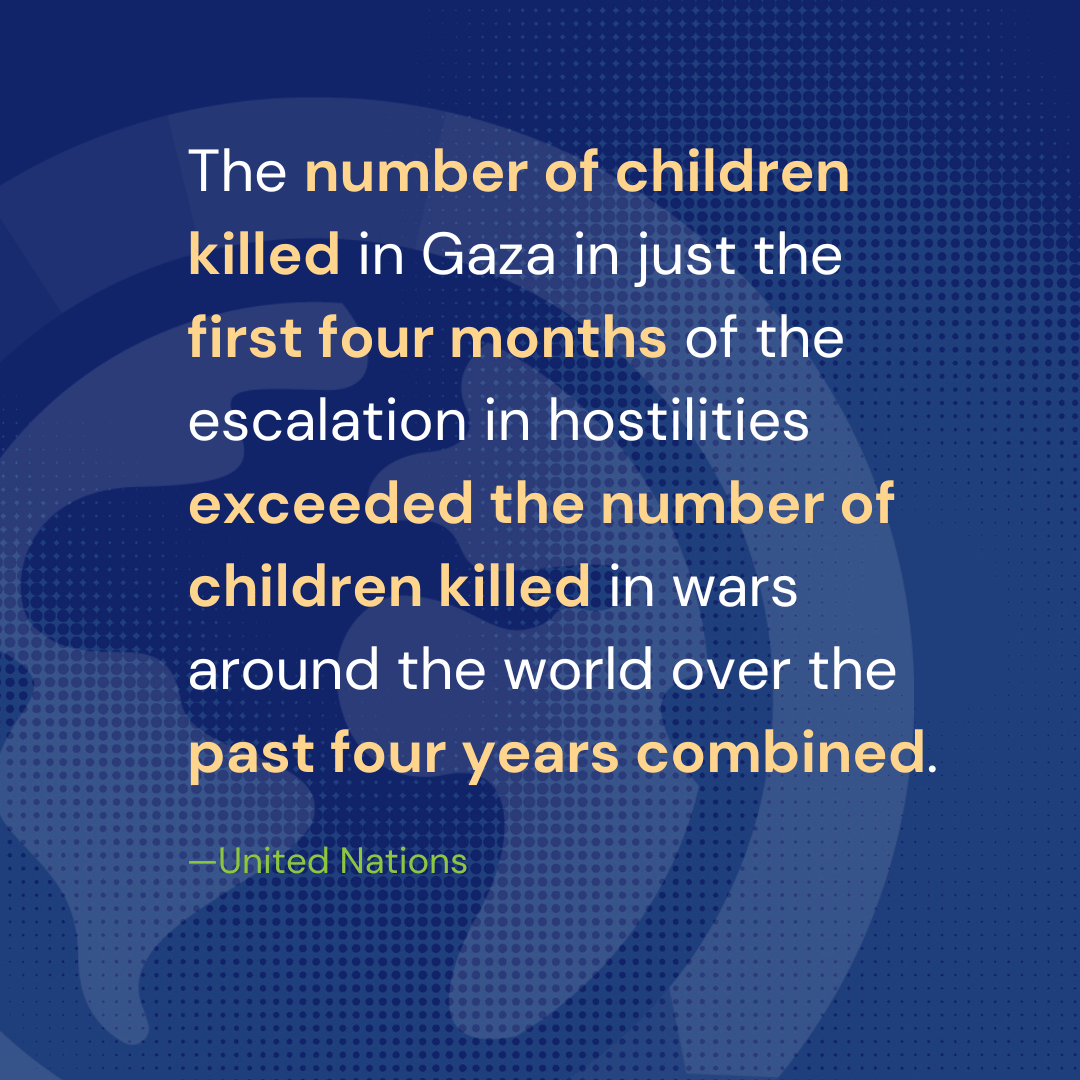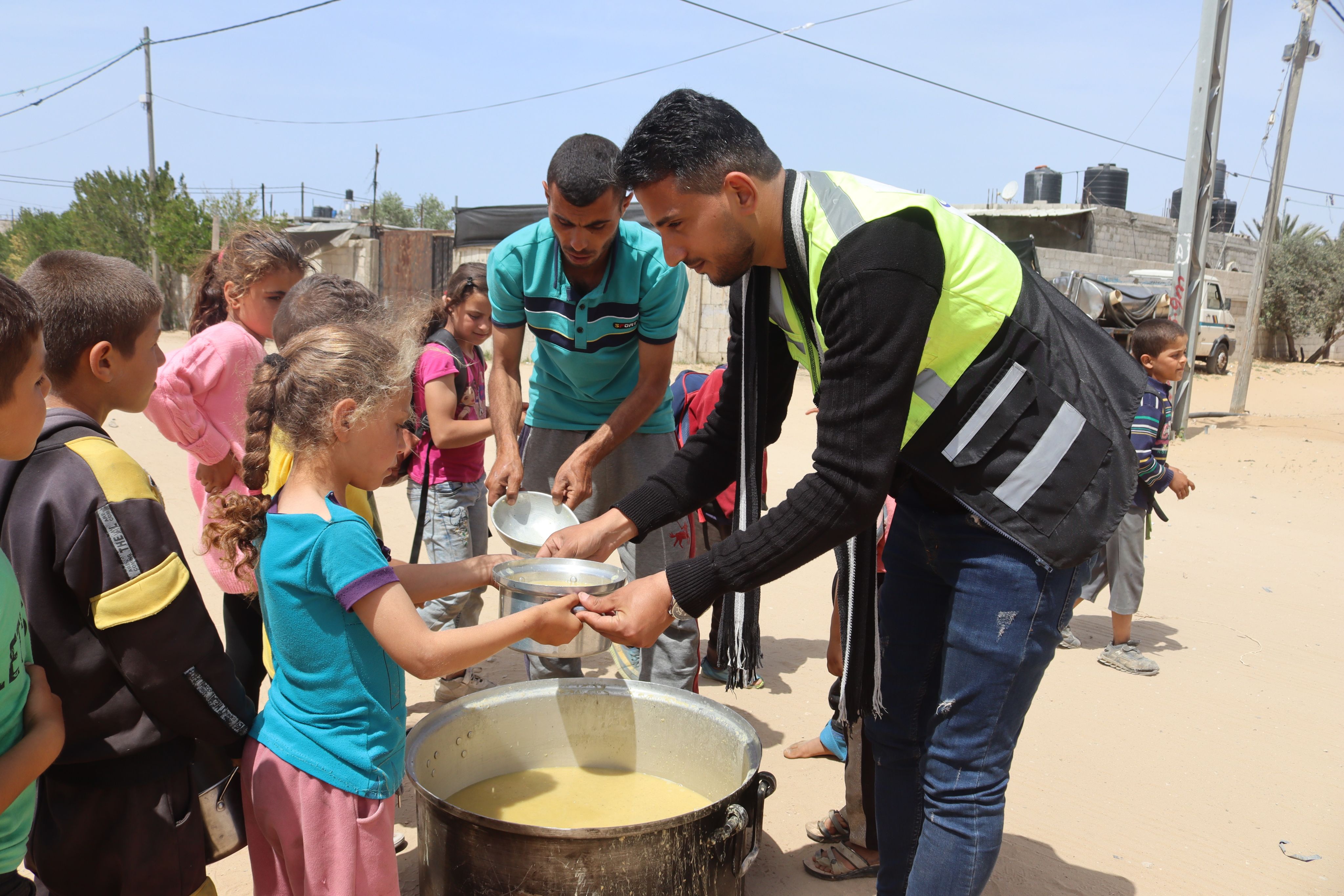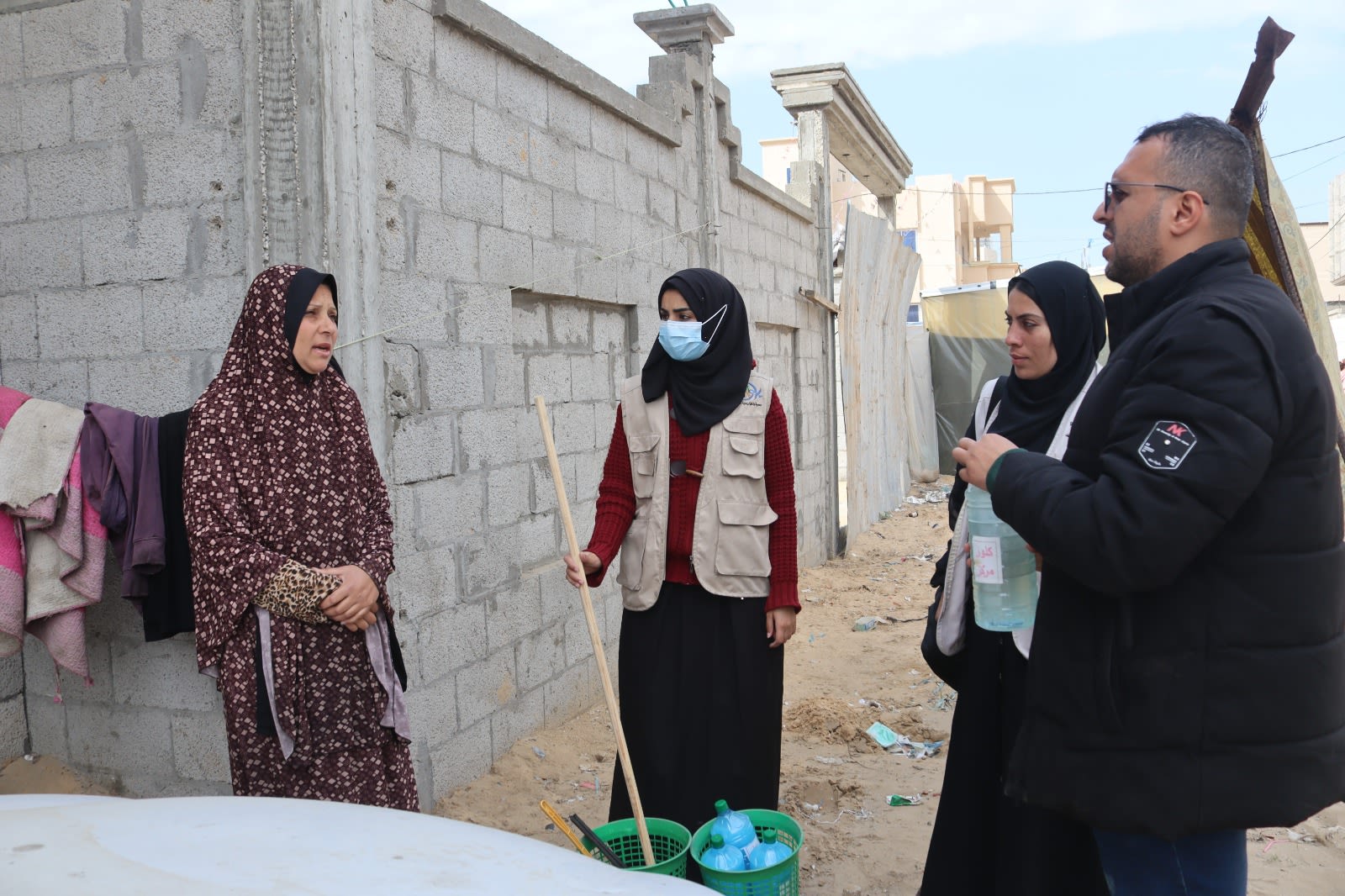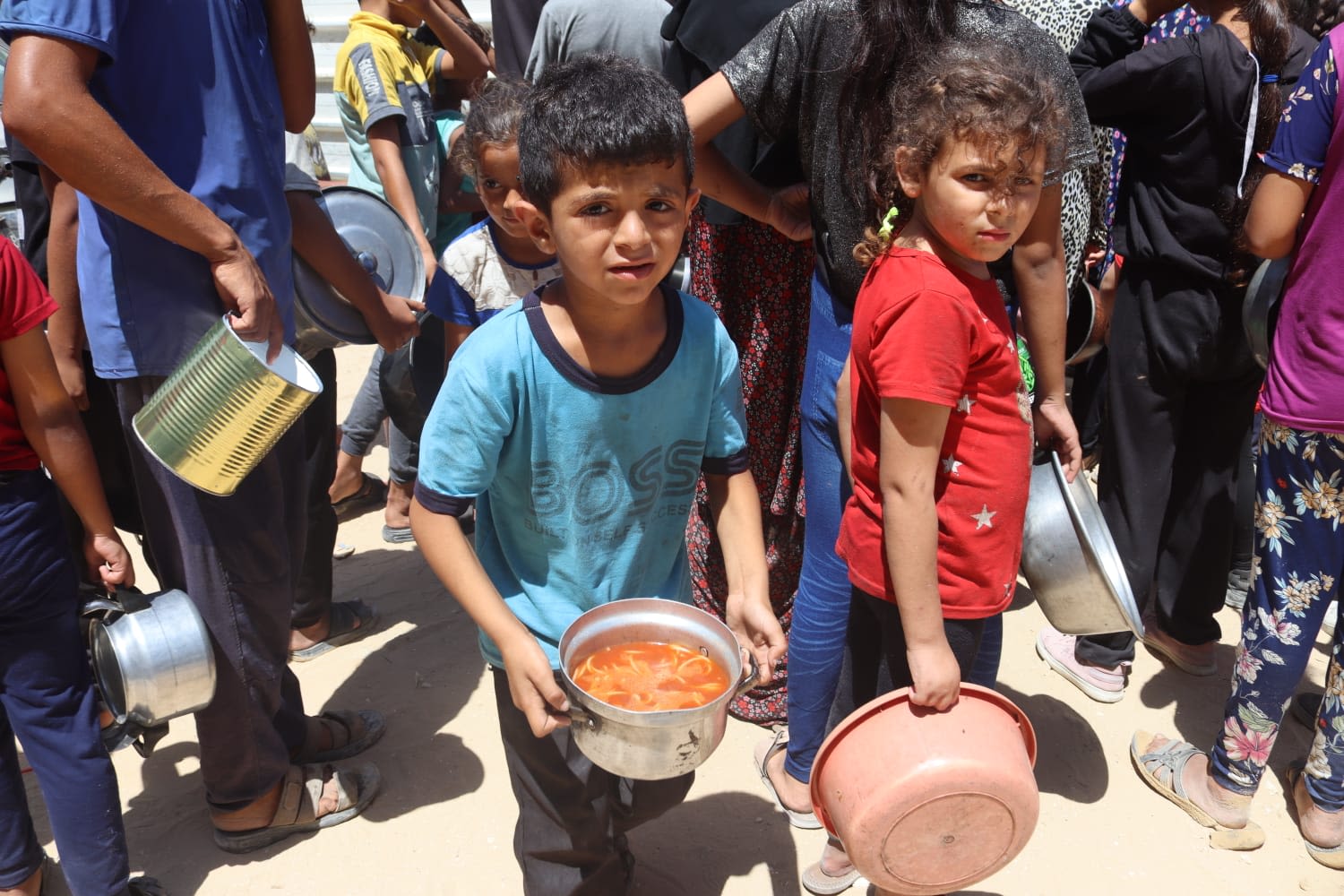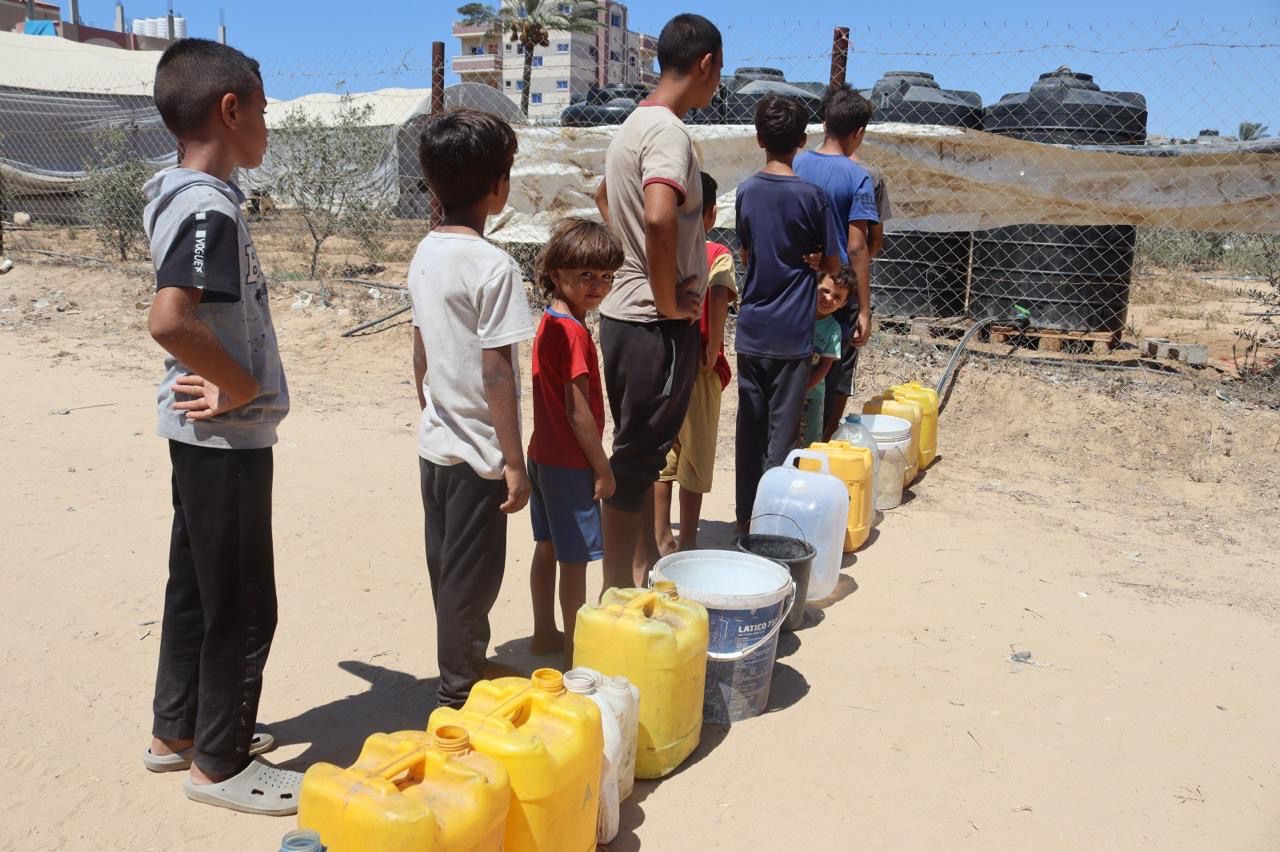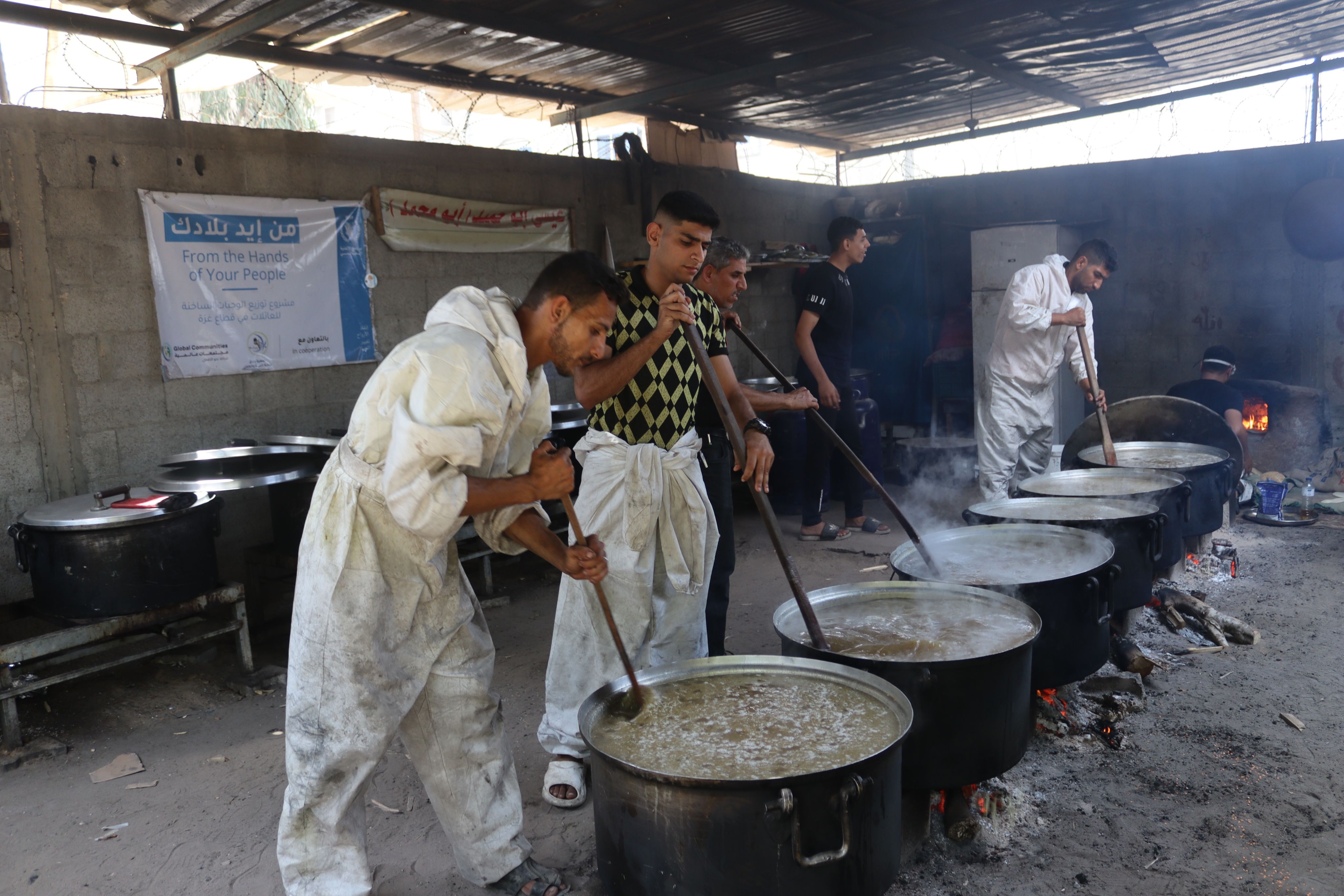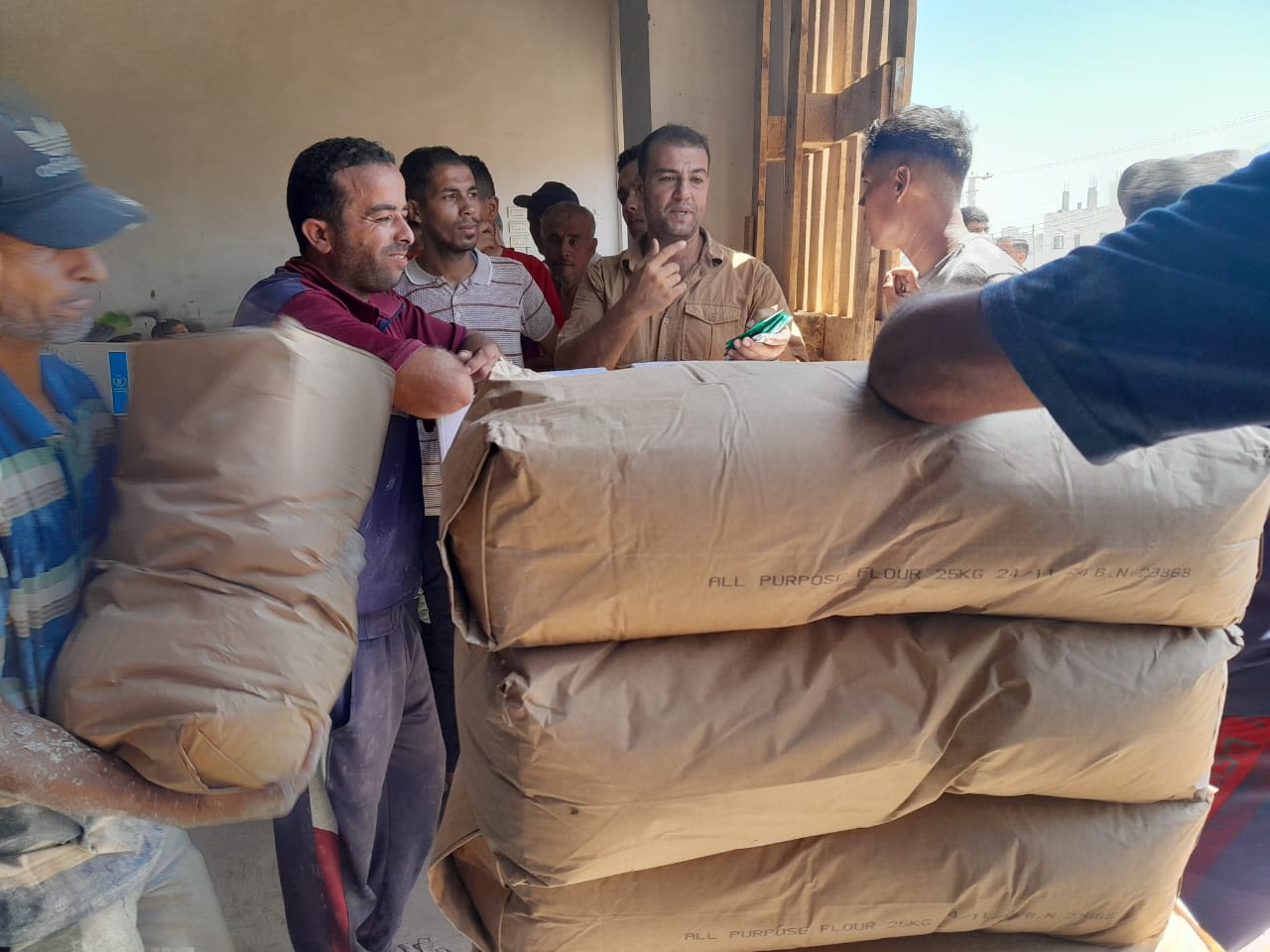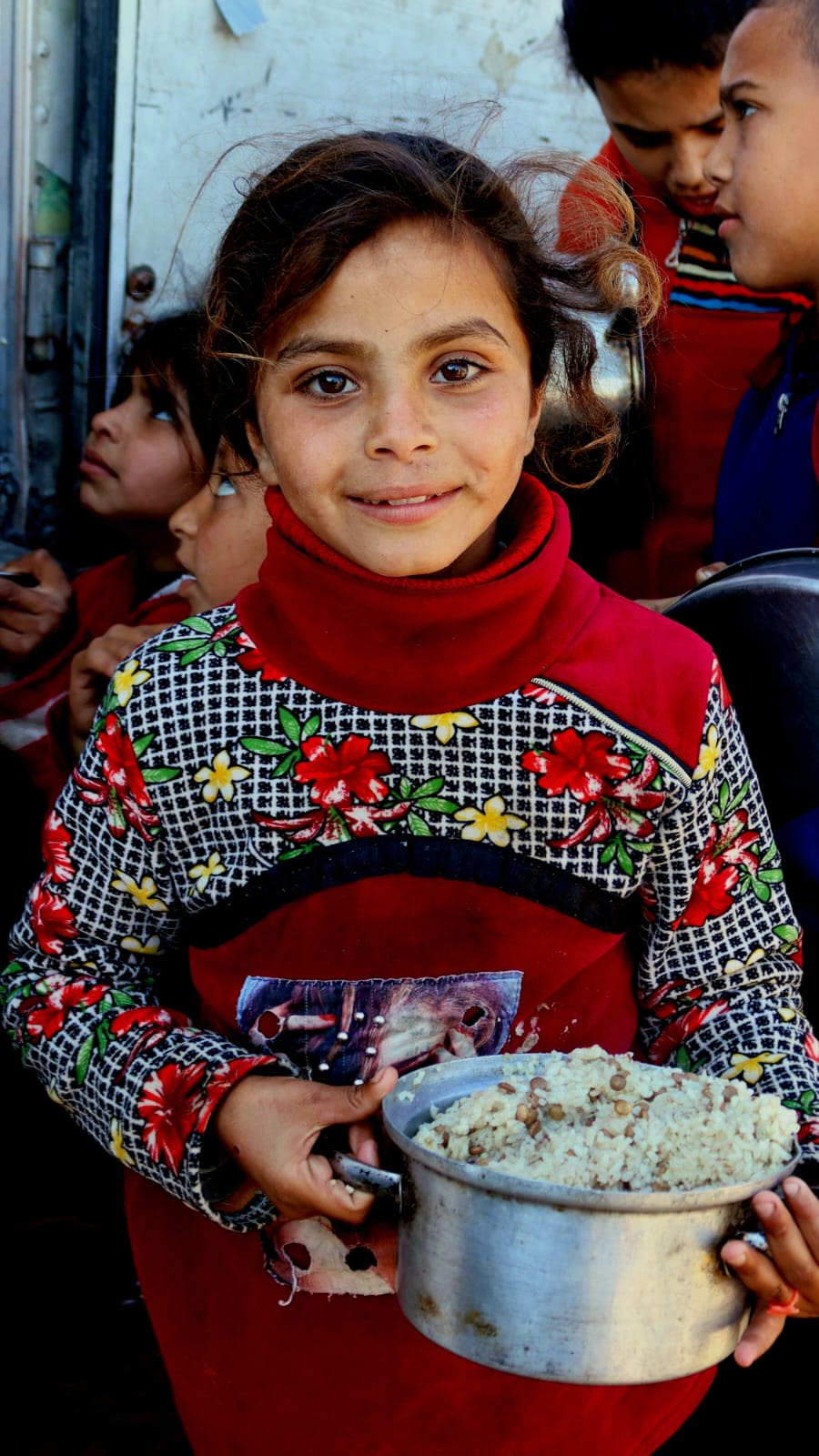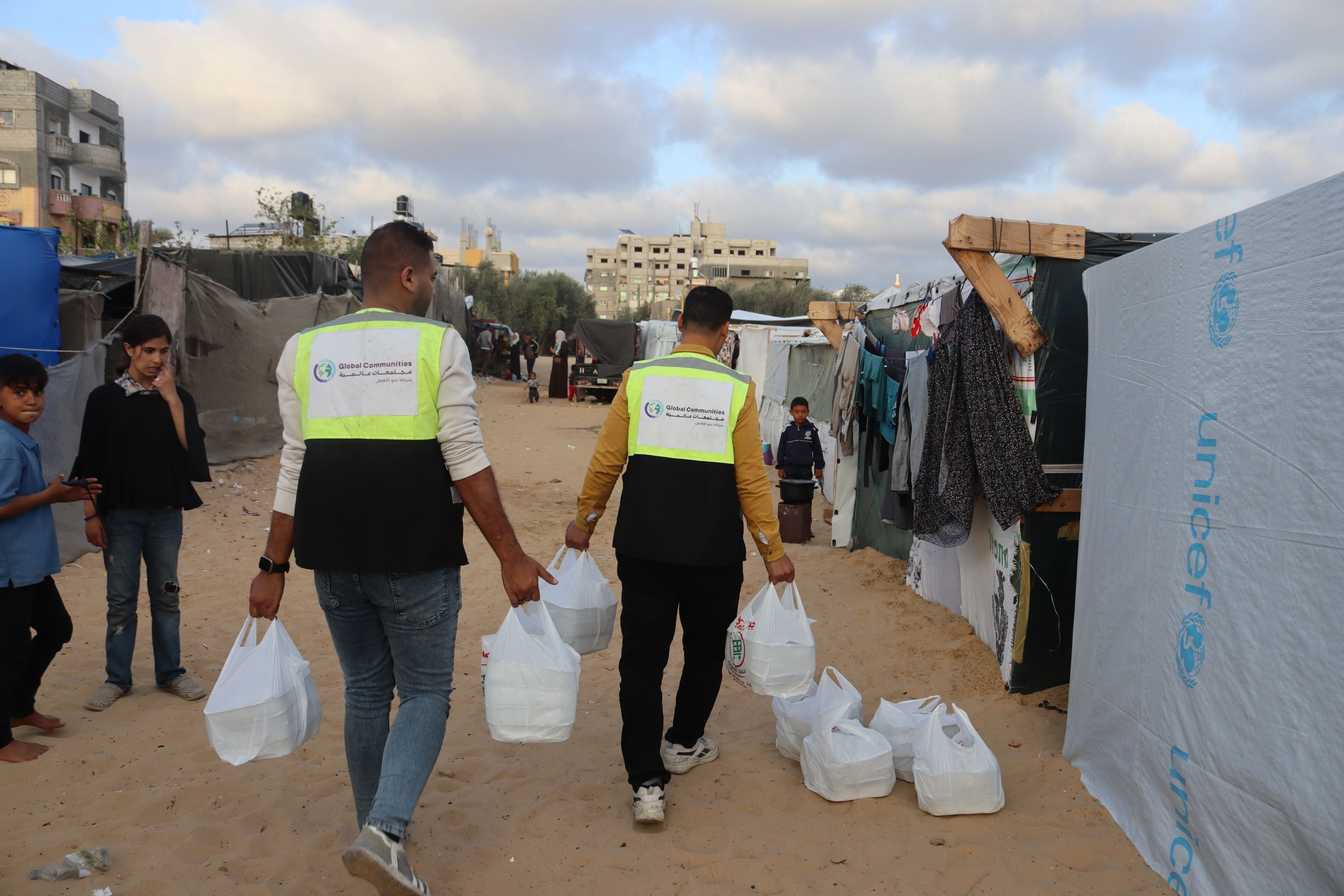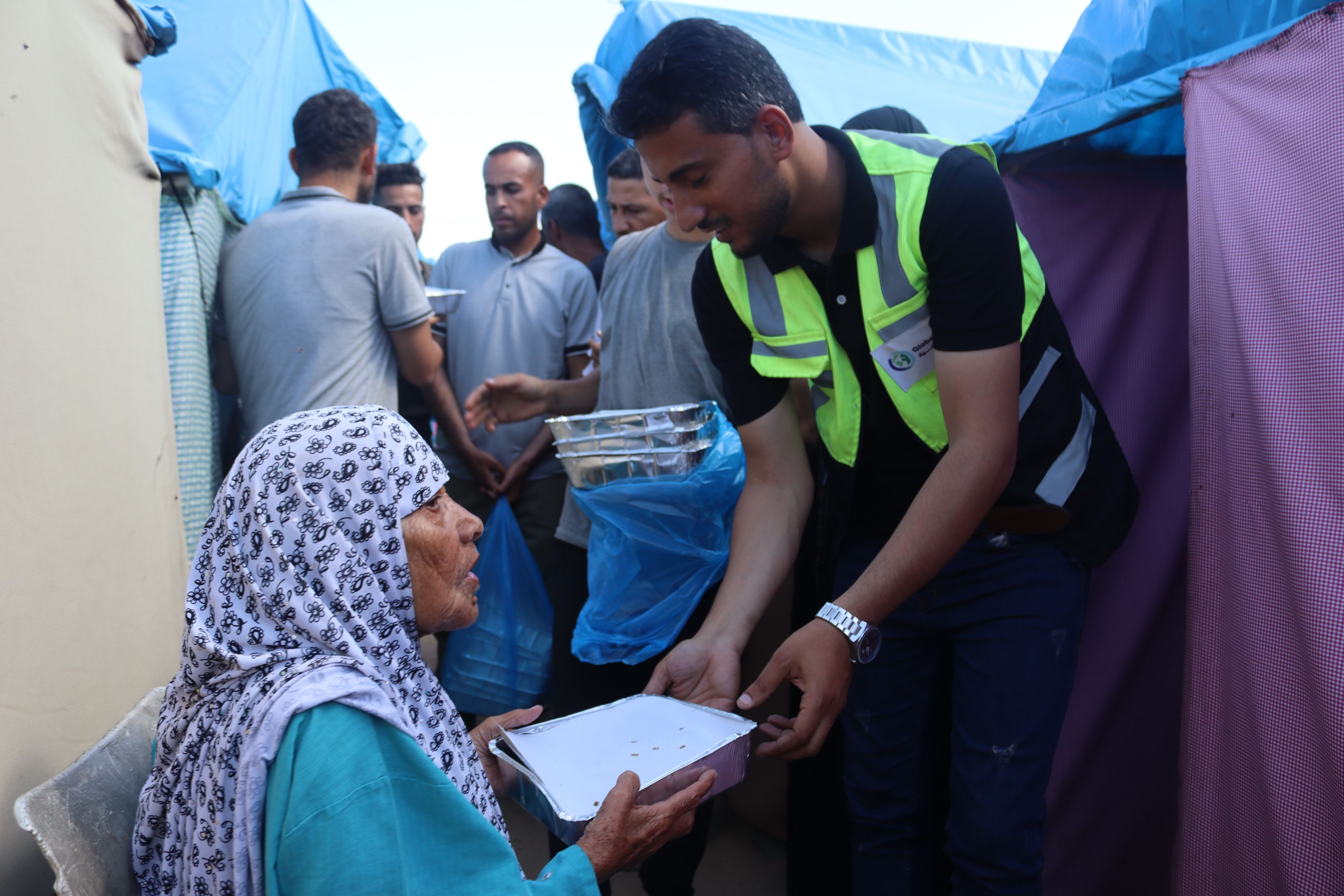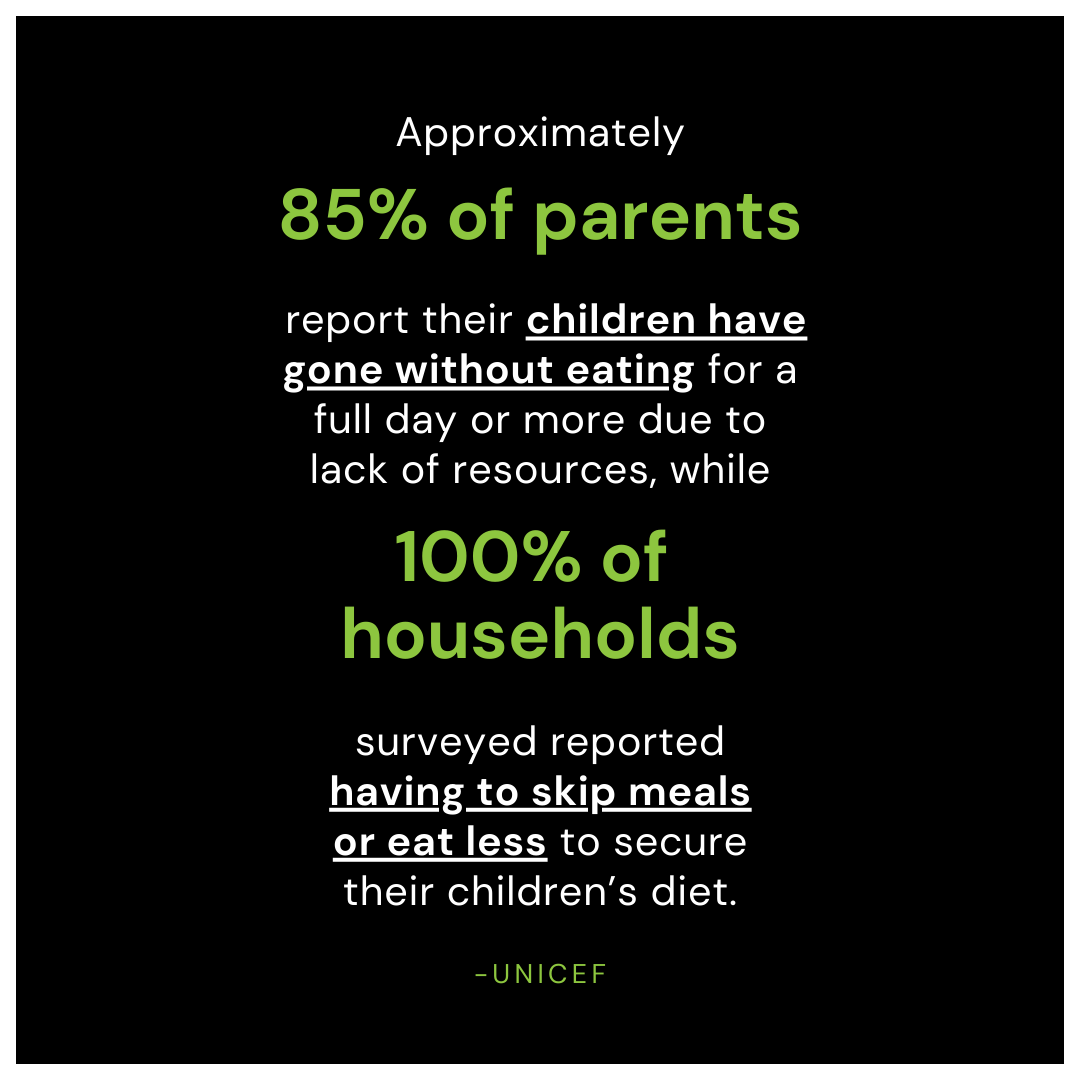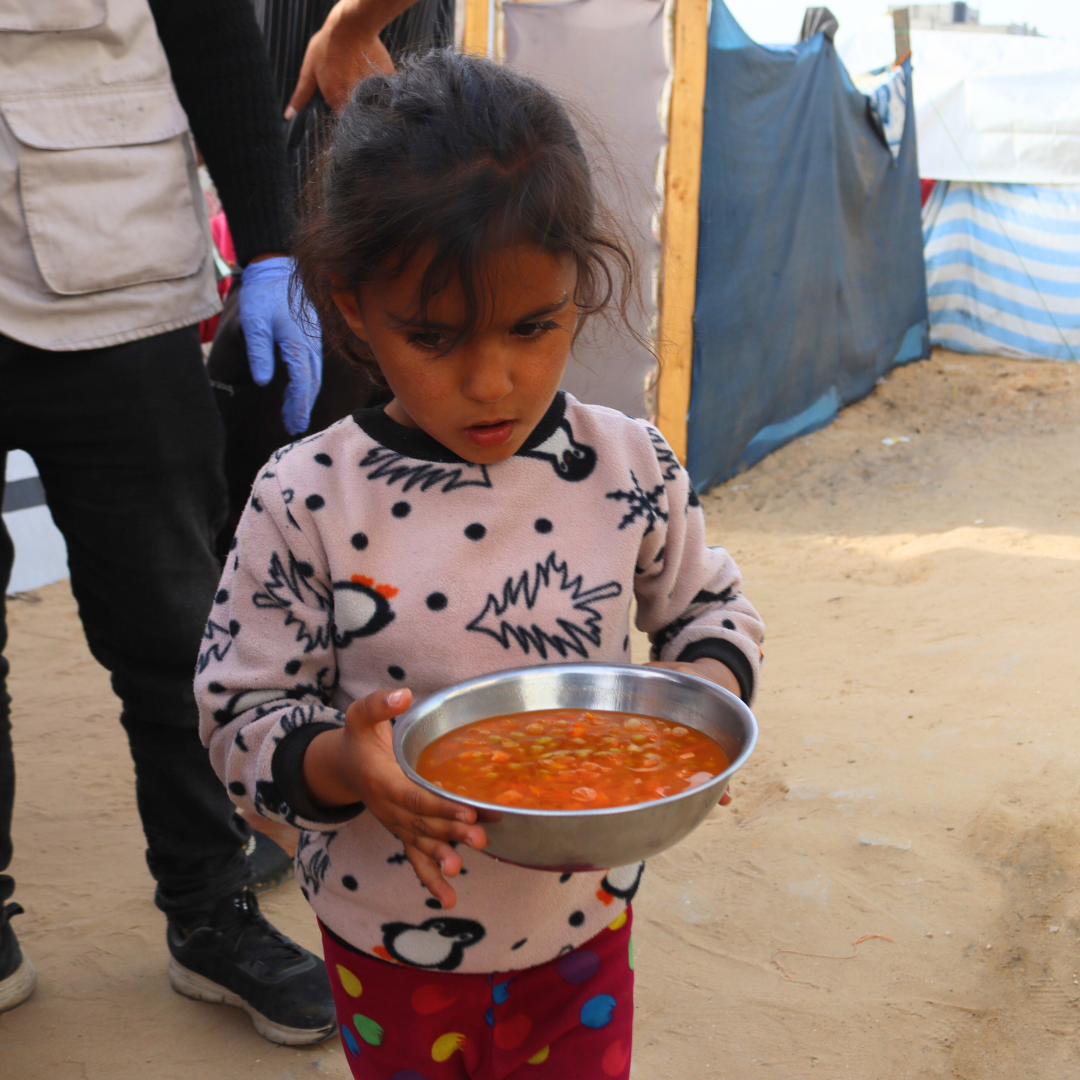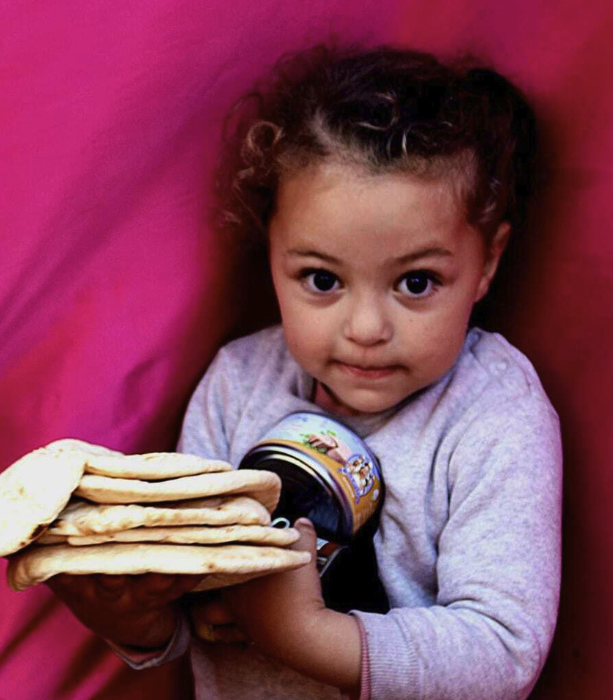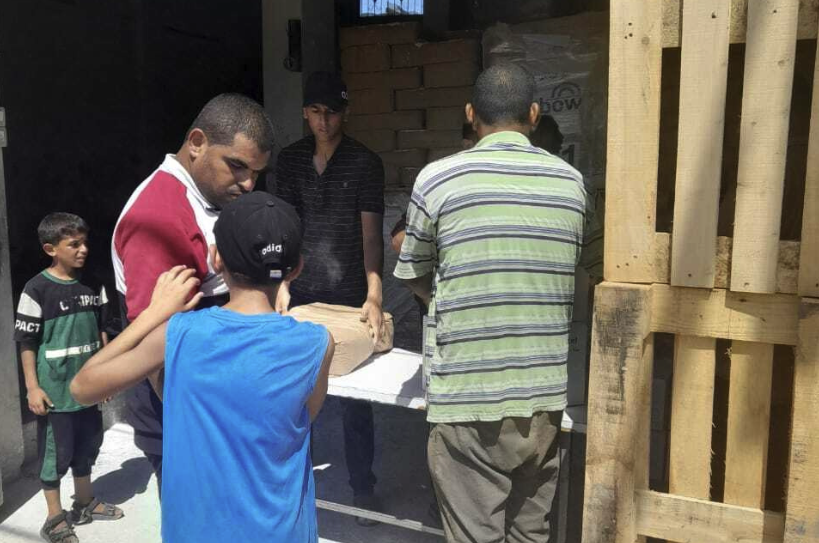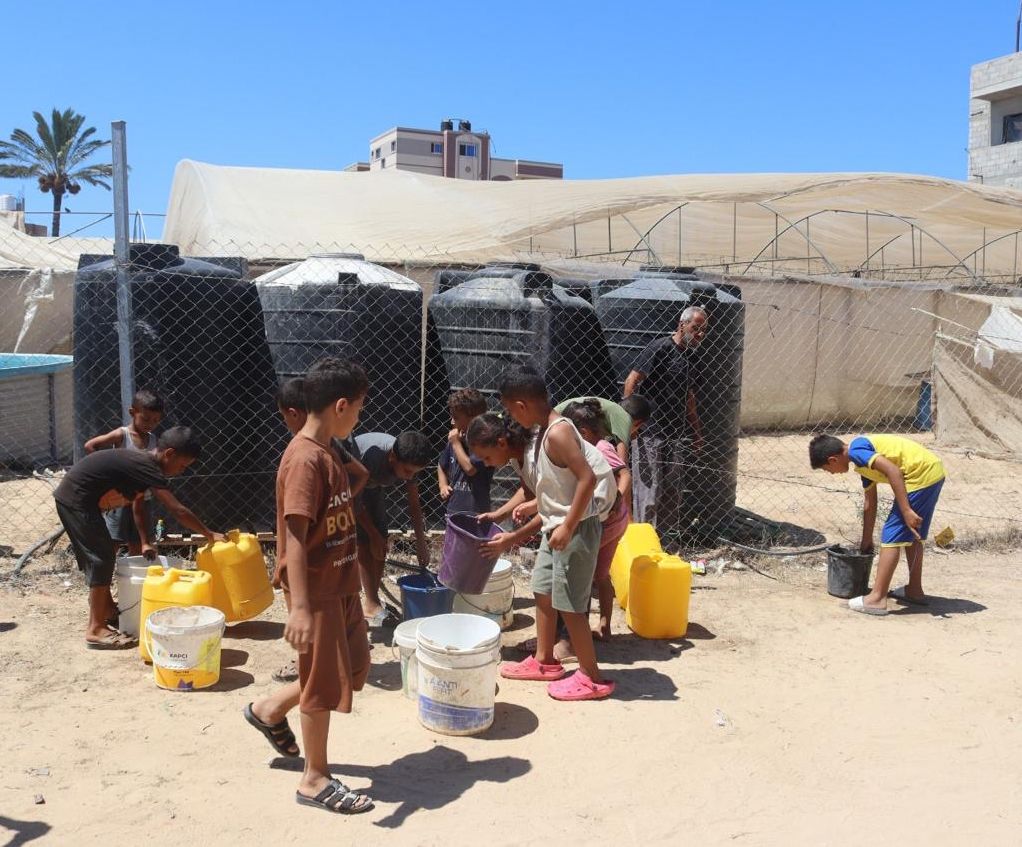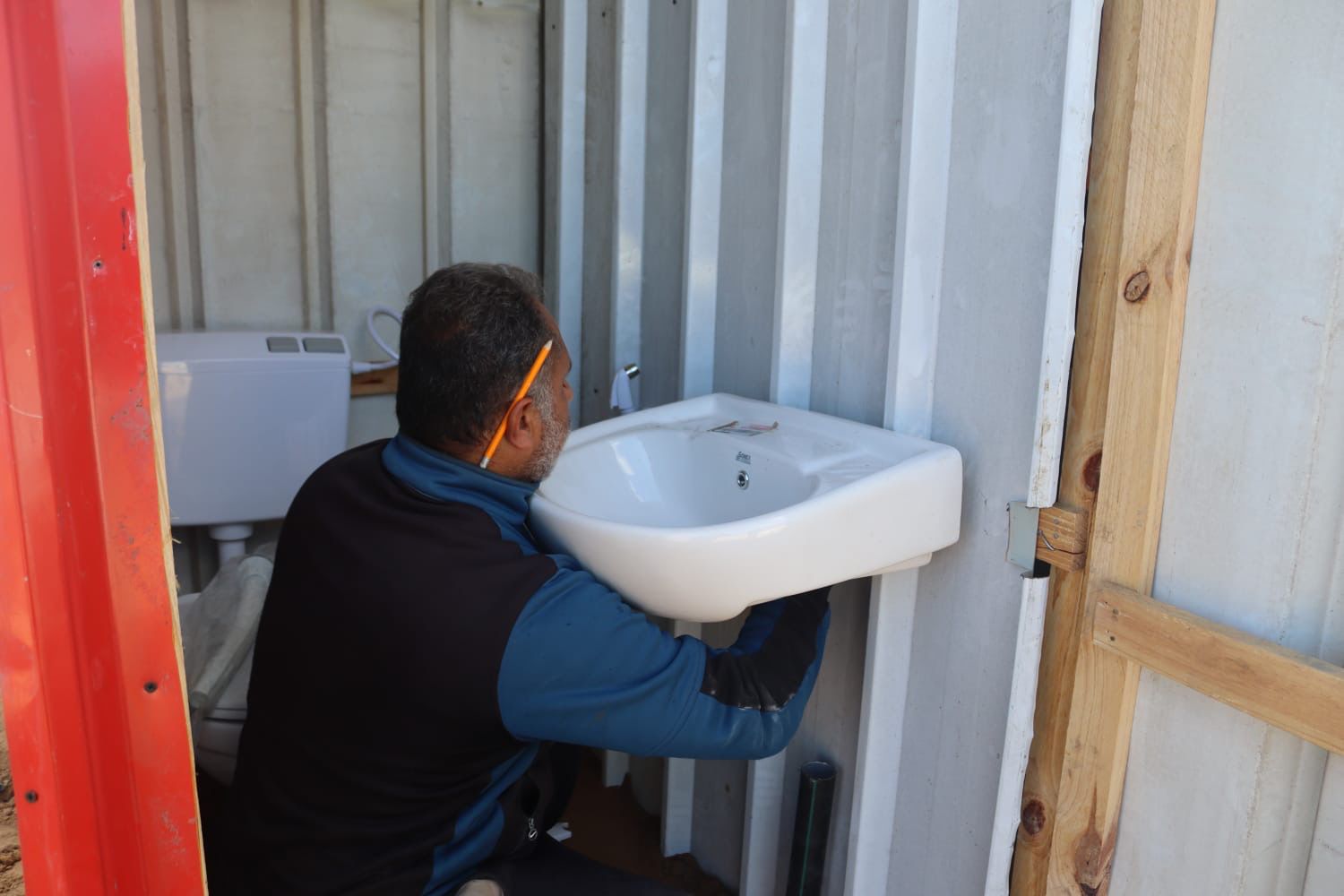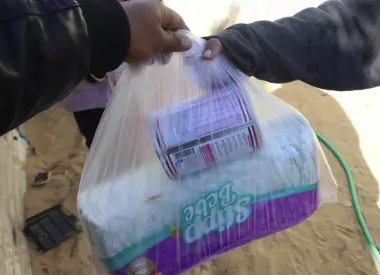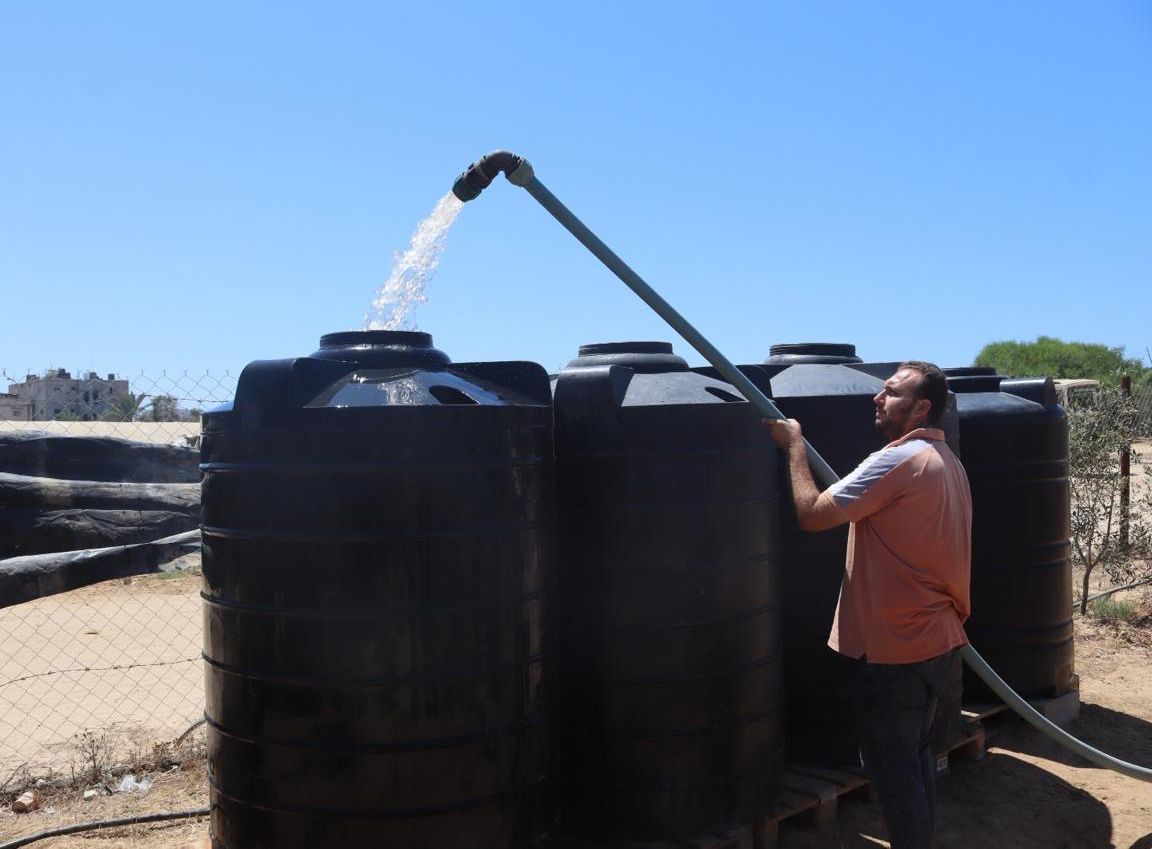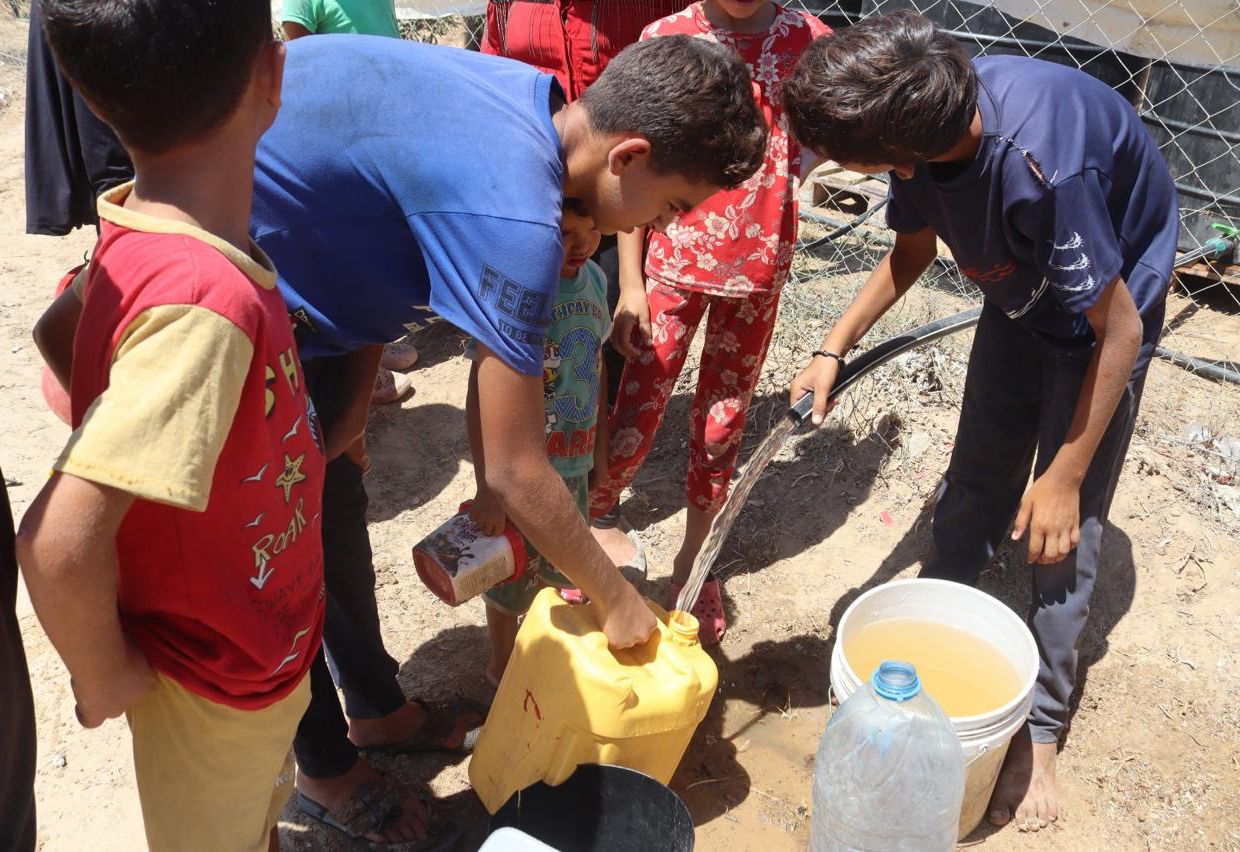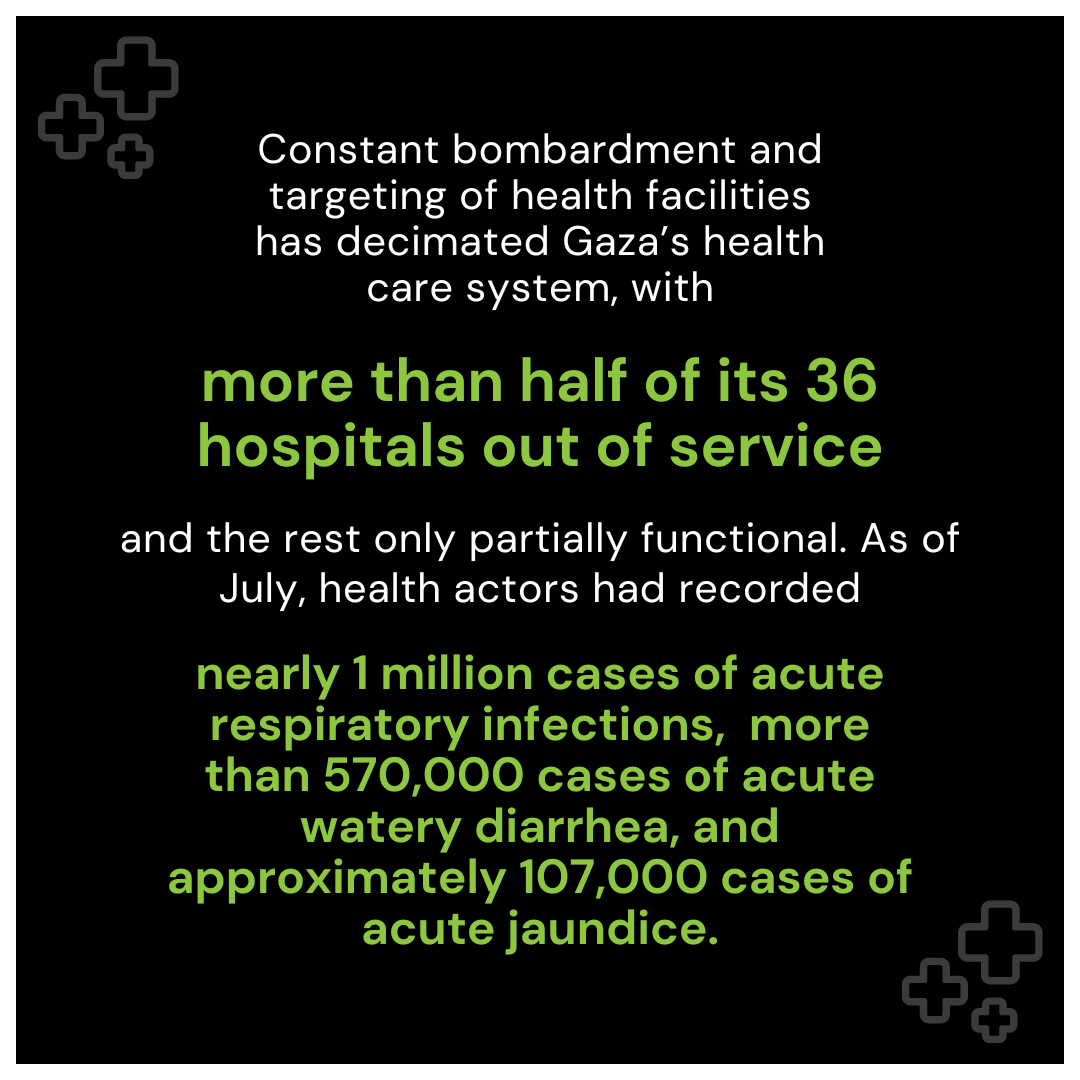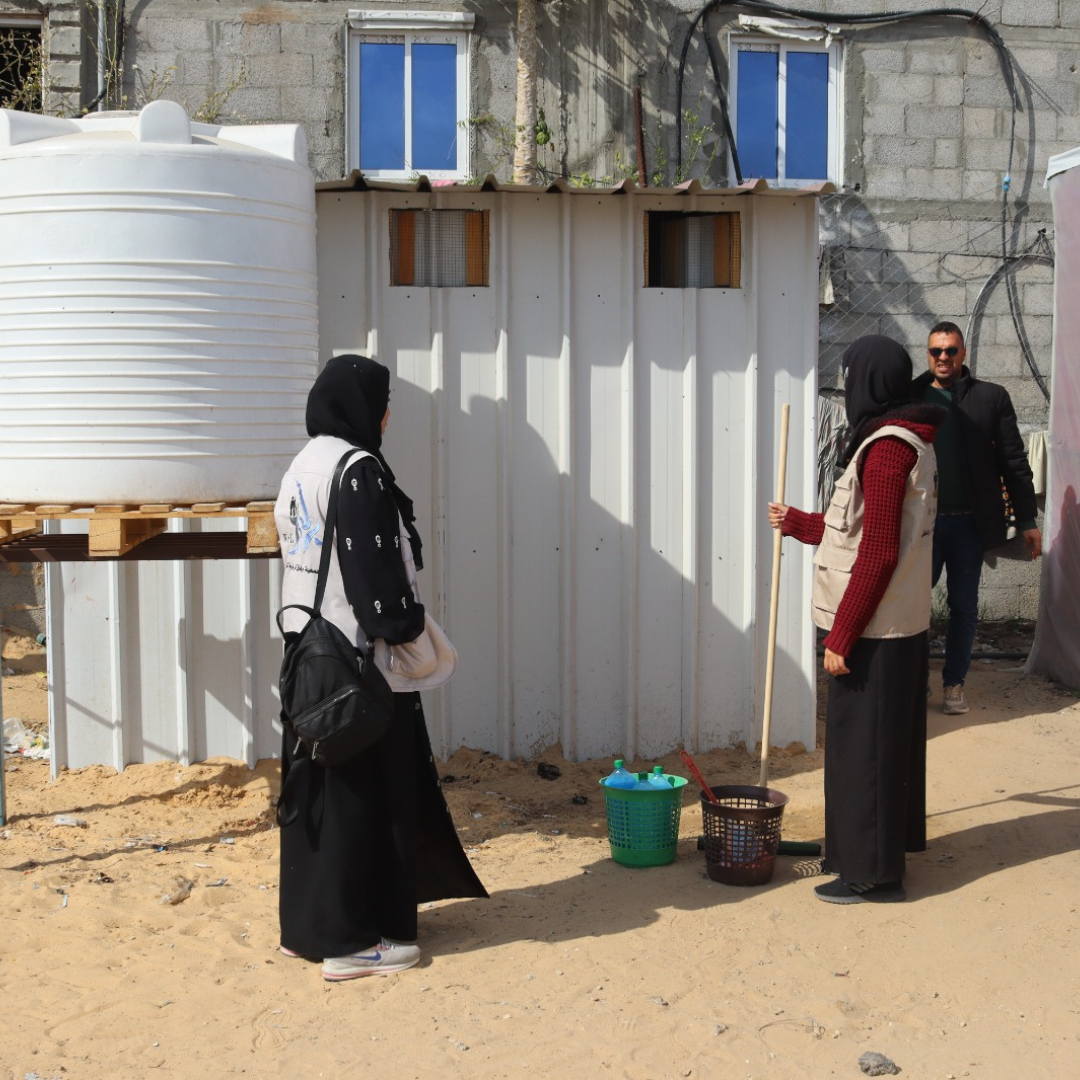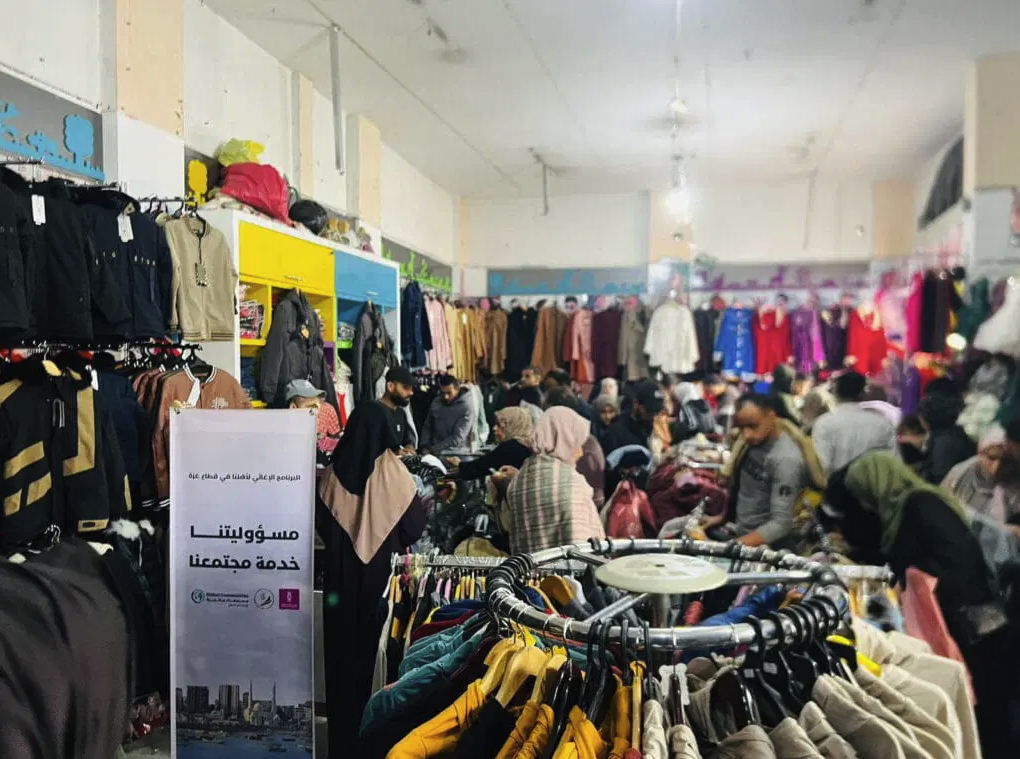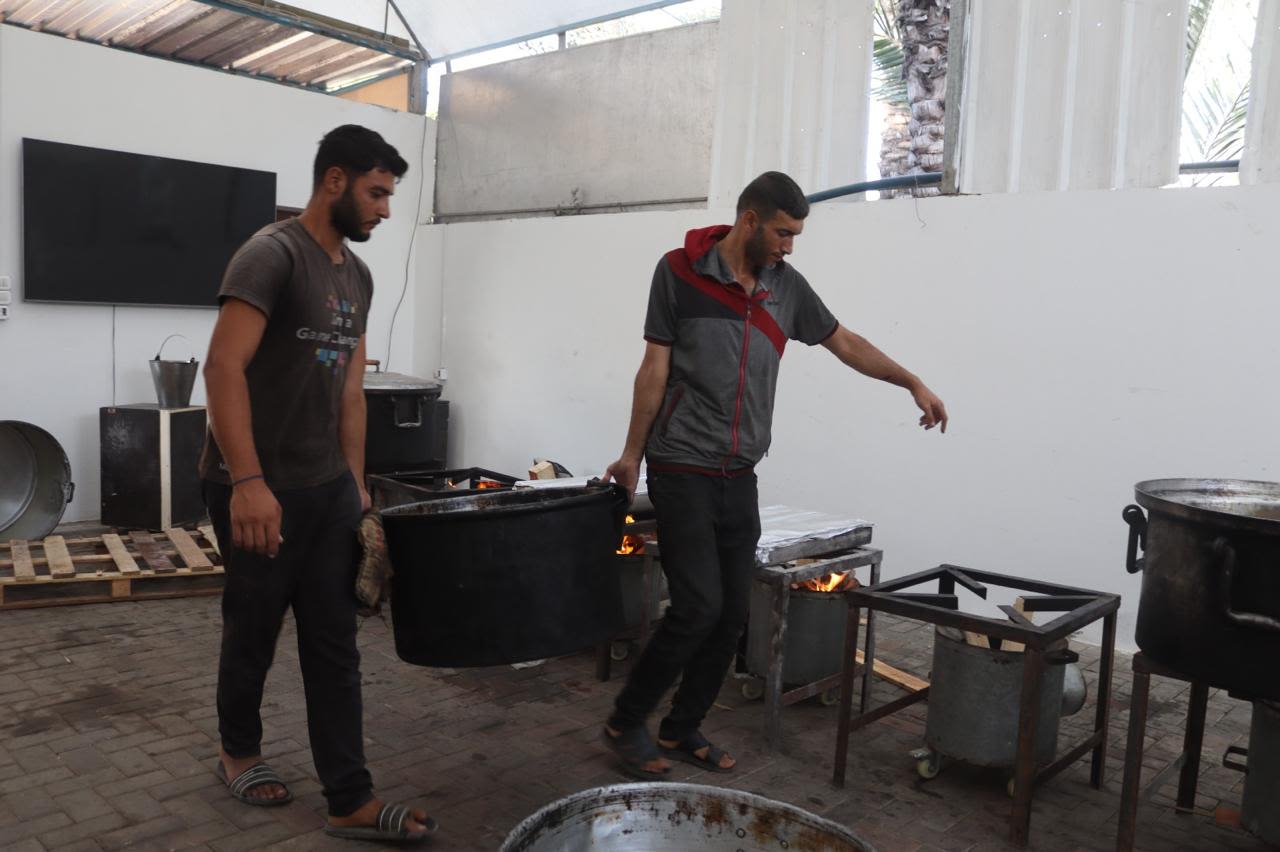A YEAR OF "HEART-WRENCHING CHOICES"
Our Ongoing Response to the War in Gaza
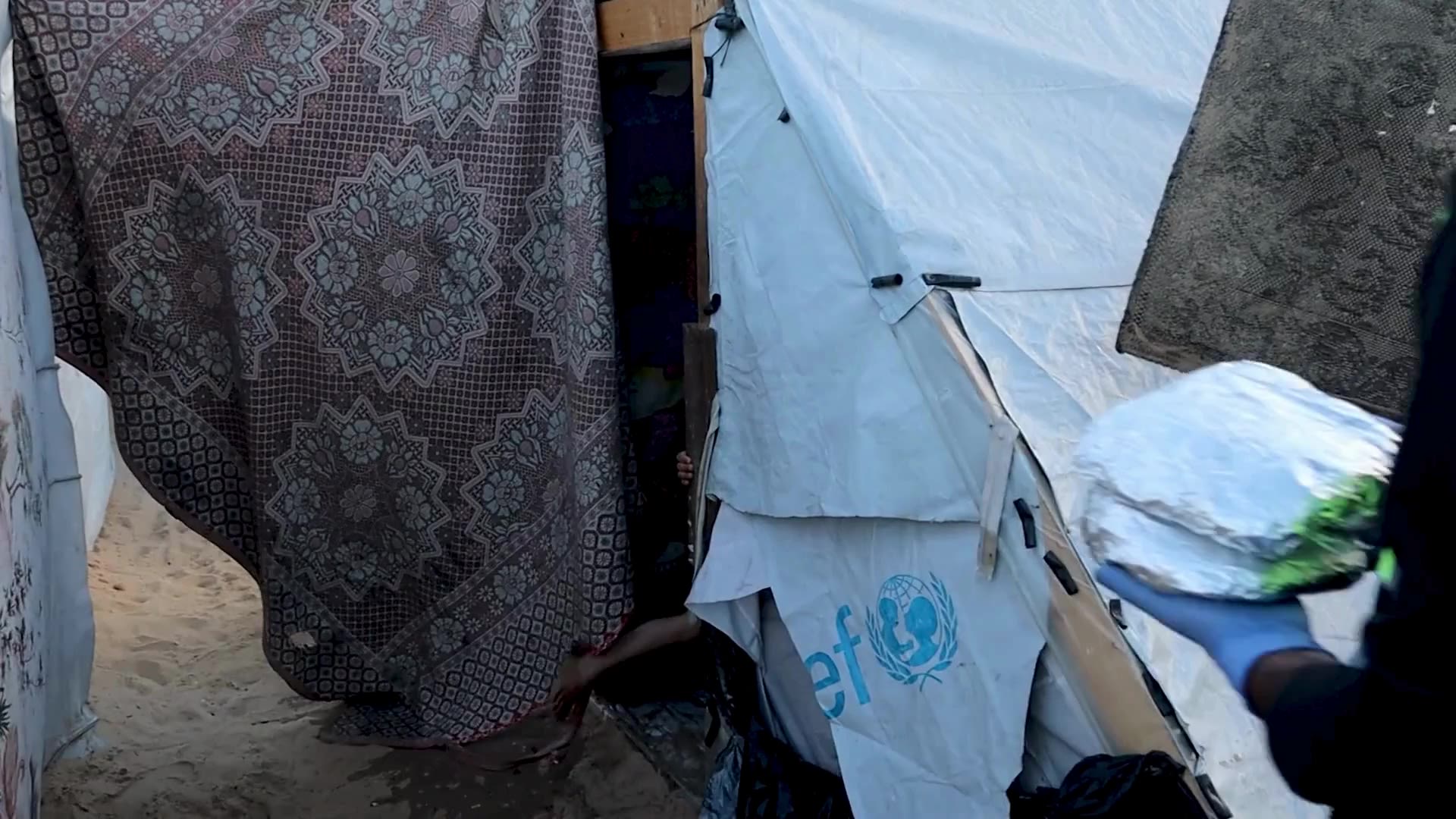
A YEAR OF "HEART-WRENCHING CHOICES"
Our Ongoing Response to the War in Gaza
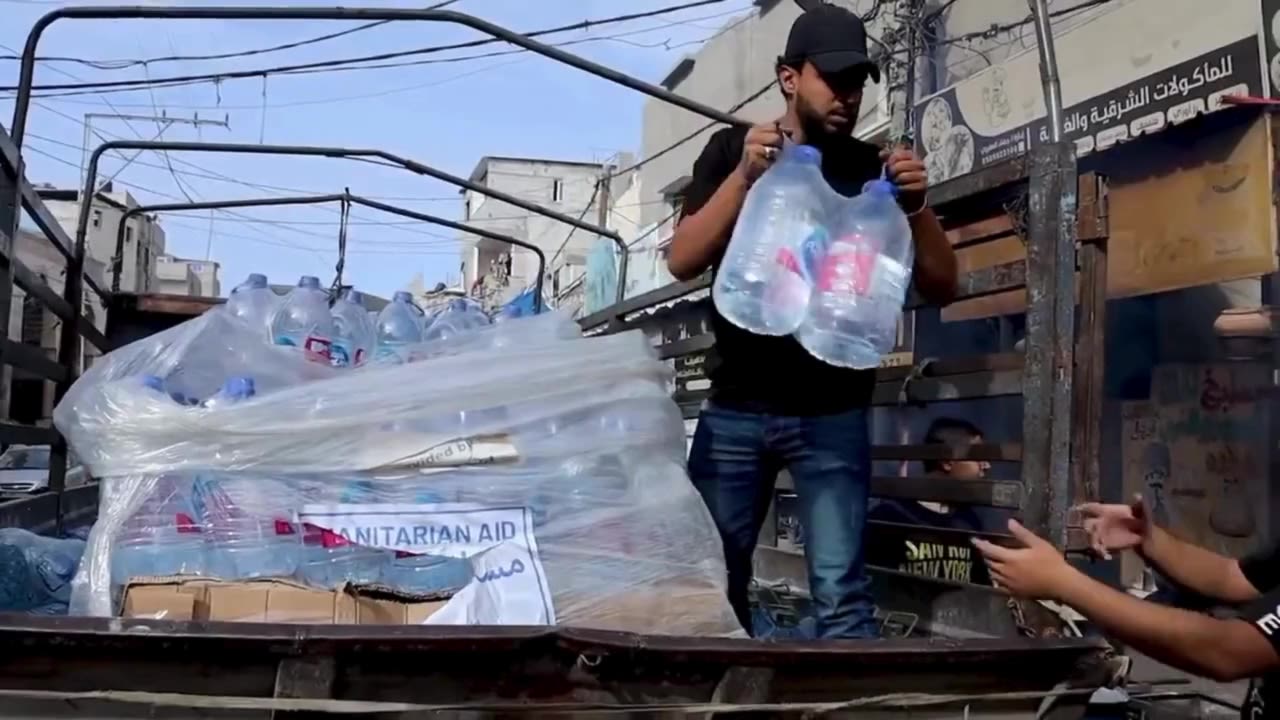
As we mark one year of the devastating Israel-Palestine war, the heartbreaking and brutal reality is that the numbers cited today are still on the rise — numbers which represent families, livelihoods, homes, critical civilian infrastructure, basic human needs and generational trauma.
On October 7, 2023, Hamas launched an unprecedented attack on Israel, killing approximately 1,200 people and taking over 200 hostages – many of whom have since been killed or remain in captivity. Soon after, Israel began its military offensive in Gaza. Ongoing intense fighting between Israel Defense Forces (IDF) and Hamas — particularly IDF airstrikes and bombardment — has led to significant civilian casualties, even in protected civilian locations like displacement sites, refugee camps, schools and hospitals. As of late September 2024, de facto health authorities in Gaza reported the deaths of 41,272 people and injury to more than 95,000 others. More than 60% of those killed are children, women, or over the age of 60.
The heartbreaking losses brought upon by the war are felt deeply by our humanitarian response teams, who have been on the frontlines of the crisis response from day one,” says Carrie Hessler-Radelet, President & CEO of Global Communities. “.. While tensions persist and the threat of a broader conflict grows, we join our colleagues in the humanitarian sector in calling for a lasting, peaceful resolution to this crisis. Our shared humanity and the well-being of countless lives depend on it.”
More than 300 aid workers, including two staff members from Global Communities, have been killed during the year of conflict: Hani Jnena and Alaa Abu Al-Khair.
As humanitarian workers, we call for adherence to international humanitarian laws and human rights principles by allowing us the opportunity to serve our people,” says one of more than 70 Global Communities staff members who is on the ground in Gaza and the West Bank. “We do not want to lose more of our colleagues. ... We need safe areas to deliver our work effectively and to ensure the safety of humanitarian workers and the people receiving our assistance.”
Since October 7, the year of escalated conflict has been marked by severe constraints to humanitarian access and operations. In particular, the Government of Israel’s restrictions on the entry of humanitarian commodities into Gaza have led to significant shortages and logistic constraints.
Intermittent closures of border crossing points into Gaza by Government of Israel authorities have also led to backlogged transport of aid and additional constraints.
Within Gaza, continued bombardment and an environment of insecurity have sharply limited the transport and distribution of humanitarian assistance and the movement of aid workers. In August, for example, 46% of the nearly 600 planned coordinated humanitarian movements in Gaza were either denied or impeded.
Despite these persistent and significant logistical challenges, and at risk to their own safety and well-being, our staff and local partners in Gaza have worked tirelessly to deliver lifesaving assistance to their communities.
People in Gaza are calling for their fundamental rights, not luxury or welfare,” the staff member says. “We need our children to go to school like every other child on the planet. We need our families to have access to fresh water, food, hygiene and health care. We simply need to get our lives back like everyone else around the world.”
Continued insecurity, heightened conflict and so-called evacuation orders from Government of Israel authorities have led to the displacement of approximately 1.9 million people, or 90% of Gaza’s population, exacerbating existing humanitarian needs and generating significant new emergency needs.
For more than three decades, Global Communities has partnered with local organizations in the West Bank and Gaza to strengthen Palestinian resilience and address the impacts of longstanding conflict. This work has included rebuilding infrastructure, promoting economic development, fostering civic engagement and advancing women’s leadership.
“The disruption to this progress is devastating, but our commitment to supporting the Palestinian people on their path to peace, healing and recovery remains as strong as ever,” Hessler-Radelet says.
FOOD ASSISTANCE
Addressing Acute Food Insecurity in Gaza
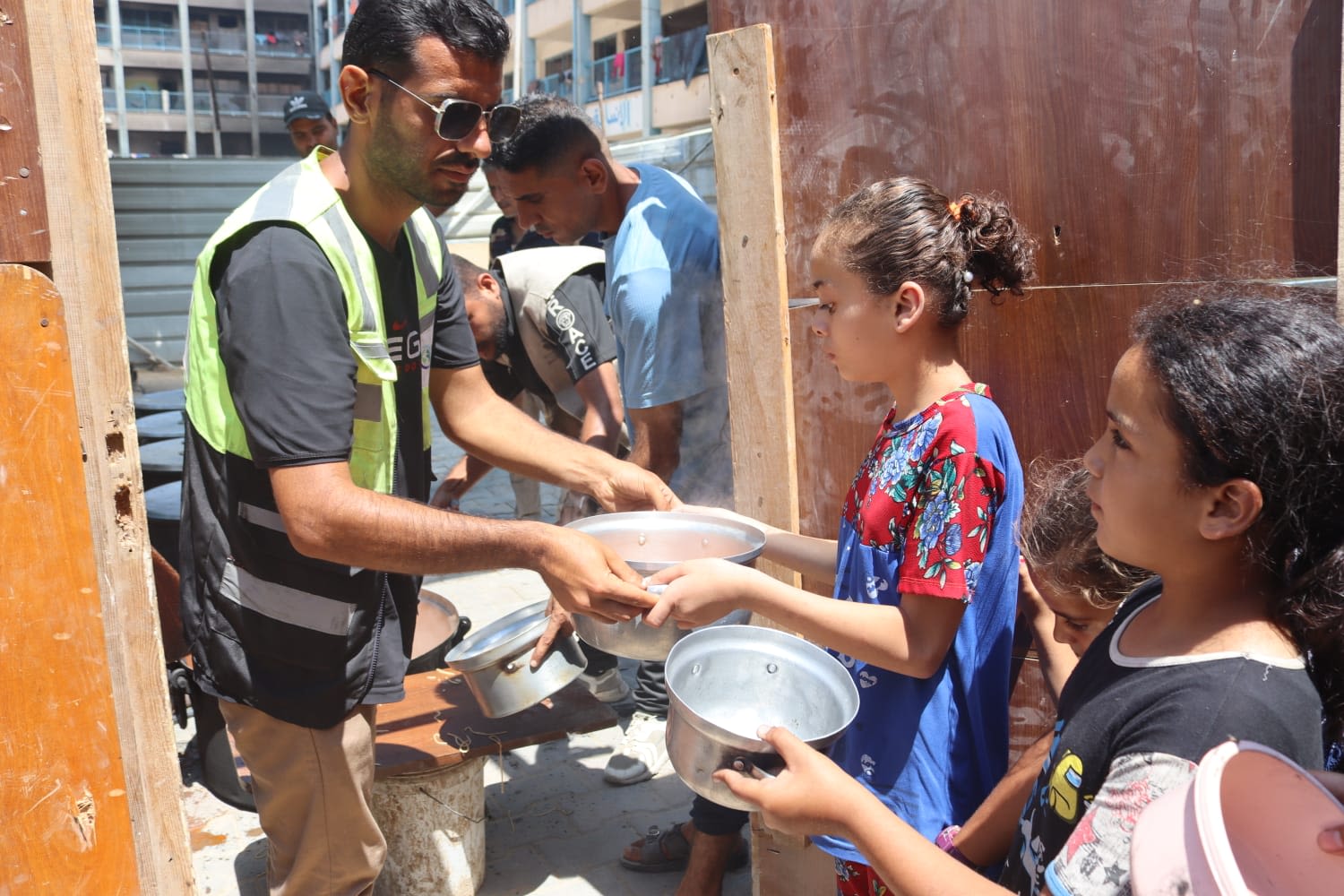
More than 2 million people — 96% of Gaza’s population — face high levels of acute food insecurity, according to Integrated Food Security Phase Classification (IPC) analysis. Nearly 500,000 people are facing catastrophic (IPC 5) levels of acute food insecurity, the highest level in the IPC system, characterized by extremely inadequate food consumption and near collapse of livelihood assets.
Every day, families are faced with heart-wrenching choices — deciding whether to prioritize food, water or medicine because they can’t access all three,” says another member of Global Communities’ Palestine country team. “The restrictions on goods entering Gaza and the ongoing violence mean that essential services people depend on are struggling to function.”
Since the October 7 escalation in hostilities, Global Communities has served as the main implementing partner for the World Food Programme (WFP), and the only partner implementing all five of WFP’s food initiatives. To date, we have distributed 555,572 WFP food parcels, each providing two weeks of support for a family of five people. In partnership with World Central Kitchen, we also distributed more than 5,200 parcels of dry and canned food to vulnerable populations in northern Gaza during September, reaching an equivalent number of households.
Other key food assistance activities include the provision of 10,000 hot meals per day in Rafah and Deir Al Balah governorates since late January, including an increase to 30,000 meals per day during the Ramadan holiday in March and April; the regular distribution of bread through as many as 12 bakeries; and the provision of lipid-based nutrient supplements to at least 8,000 people, primarily pregnant and lactating women, during Spring 2024.
“Even with limited resources and capacities, we continue to do everything possible to provide relief to those who need it most,” the second staff member says.
Global Communities’ staff and local partners in Gaza have also maintained vital distribution networks for in-kind humanitarian food assistance. Using supplies procured and transported by a logistics company, we have distributed more than 14,900 bags of flour — totaling 373 metric tons (MT) — to families in need in central Gaza’s Deir Al Balah Governorate as of late September. These distributions have provided more than 2.3 million meals worth of flour. Global Communities plans to distribute more than 500 additional MT of flour in the coming weeks and continue to scale up operations to reach families in urgent need of food assistance.
More than 2 million people — 96% of Gaza’s population — face high levels of acute food insecurity, according to Integrated Food Security Phase Classification (IPC) analysis. Nearly 500,000 people are facing catastrophic (IPC 5) levels of acute food insecurity, the highest level in the IPC system, characterized by extremely inadequate food consumption and near collapse of livelihood assets.
Since the October 7 escalation in hostilities, Global Communities has served as the main implementing partner for the World Food Programme (WFP), and the only partner implementing all five of WFP’s food initiatives. To date, we have distributed 555,572 WFP food parcels, each providing two weeks of support for a family of five people. In partnership with World Central Kitchen, we also distributed more than 5,200 parcels of dry and canned food to vulnerable populations in northern Gaza during September, reaching an equivalent number of households.
Every day, families are faced with heart-wrenching choices — deciding whether to prioritize food, water or medicine because they can’t access all three,” says a member of Global Communities’ Palestine country team. “The restrictions on goods entering Gaza and the ongoing violence mean that essential services people depend on are struggling to function.”
Other key food assistance activities include the provision of 10,000 hot meals per day in Rafah and Deir Al Balah governorates since late January, including an increase to 30,000 meals per day during the Ramadan holiday in March and April; the regular distribution of bread through as many as 12 bakeries; and the provision of lipid-based nutrient supplements to at least 8,000 people, primarily pregnant and lactating women, during Spring 2024.
“Even with limited resources and capacities, we continue to do everything possible to provide relief to those who need it most,” he says.
Global Communities’ staff and local partners in Gaza have also maintained vital distribution networks for in-kind humanitarian food assistance. Using supplies procured and transported by a logistics company, we have distributed more than 14,900 bags of flour — totaling 373 metric tons (MT) — to families in need in central Gaza’s Deir Al Balah Governorate as of late September. These distributions have provided more than 2.3 million meals worth of flour. Global Communities plans to distribute more than 500 additional MT of flour in the coming weeks and continue to scale up operations to reach families in urgent need of food assistance.
WATER, SANITATION & HYGIENE
Meeting Urgent WASH Needs Amid Adversity
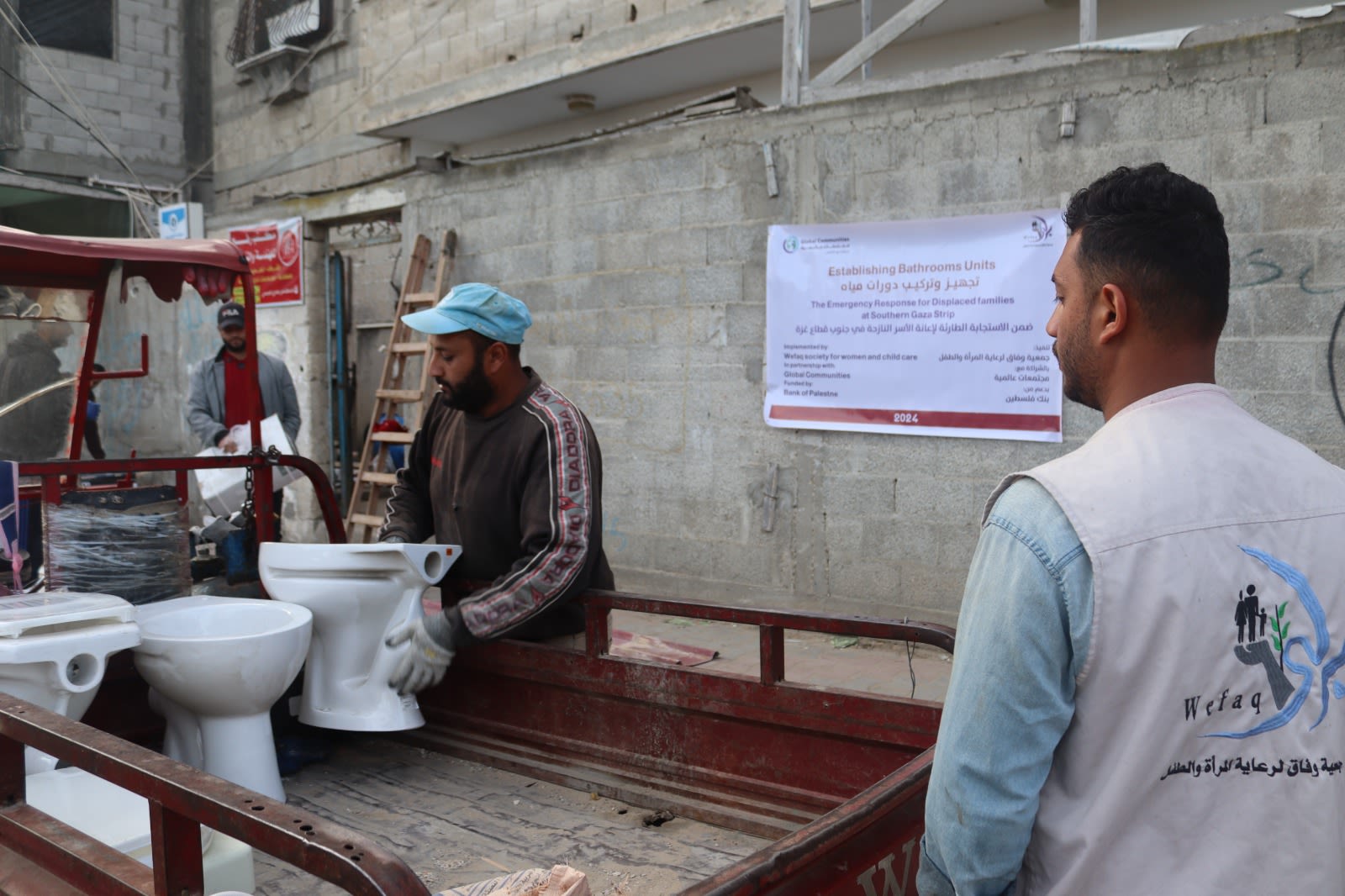
Water, sanitation and hygiene (WASH) and health needs remain severe for populations in Gaza as well. Restrictions on water piped from Israel, damage to WASH infrastructure and access issues led to significant water shortages during the year. As of late September, the average daily amount of water produced or supplied for populations in Gaza was still only approximately one-quarter of the daily water supply prior to October 2023. Damage to sewage systems has led to the accumulation of approximately 395,000 MT of solid waste in Gaza, raising serious health and hygiene risks.
In the absence of safe water to drink, cook and bathe with, families are having to resort to using salty and contaminated water, which has increased the spread of waterborne illness and disease.
The needs are very huge, and any intervention will absolutely lead to better change,” says a third staff member who is managing Global Communities’ Gaza Household WASH program.
This USAID-funded initiative was established prior to the October 7 escalation in hostilities but has been able to adapt activities to meet the urgent WASH needs of displaced populations, including through the installation of 750 latrines in central Gaza as of September.
These latrines have had a great impact in improving the lives of the displaced people who face many difficulties and problems, especially for girls, women, children, the elderly and the disabled,” he says, explaining how many people were traveling long distances in dangerous conditions to meet this basic need or had no options at all. “... We hope that this tragedy will come to an end soon and that Gazans can return to practicing their normal lives.”
Additional funding from the Bank of Palestine allowed Global Communities to distribute hygiene kits to 3,000 people in January and construct and install 20 WASH units in early March. Each unit contained three latrines and three sinks, and collectively met the WASH needs of approximately 800 families in informal settlements.
More recently, with support from the Swedish International Development Agency and the Palestine Investment Fund, a well was upgraded in Deir Al Balah Governorate that supplies water for 8,400 displaced individuals and essential irrigation for 50 farmers.
The well can operate for 8 hours a day now instead of 3, helping to mitigate health risks, improve living conditions and uphold dignity among the some of the most vulnerable populations in conflict-affected areas lacking these critical facilities.
Water, sanitation and hygiene (WASH) and health needs remain severe for populations in Gaza as well. Restrictions on water piped from Israel, damage to WASH infrastructure and access issues led to significant water shortages during the year. As of late September, the average daily amount of water produced or supplied for populations in Gaza was still only approximately one-quarter of the daily water supply prior to October 2023. Damage to sewage systems has led to the accumulation of approximately 395,000 MT of solid waste in Gaza, raising serious health and hygiene risks.
In the absence of safe water to drink, cook and bathe with, families are having to resort to using salty and contaminated water, which has increased the spread of waterborne illness and disease.
This USAID-funded initiative was established prior to the October 7 escalation in hostilities but has been able to adapt activities to meet the urgent WASH needs of displaced populations, including through the installation of 750 latrines in central Gaza as of September.
These latrines have had a great impact in improving the lives of the displaced people who face many difficulties and problems, especially for girls, women, children, the elderly and the disabled,” he says, explaining how many people were traveling long distances in dangerous conditions to meet this basic need or had no options at all. “... We hope that this tragedy will come to an end soon and that Gazans can return to practicing their normal lives.”
The needs are very huge, and any intervention will absolutely lead to better change,” says a staff member who is managing Global Communities’ Gaza Household WASH program.
Additional funding from the Bank of Palestine allowed Global Communities to distribute hygiene kits to 3,000 people in January and construct and install 20 WASH units in early March. Each unit contained three latrines and three sinks, and collectively met the WASH needs of approximately 800 families in informal settlements.
More recently, with support from the Swedish International Development Agency and the Palestine Investment Fund, a well was upgraded in Deir Al Balah Governorate that supplies water for 8,400 displaced individuals and essential irrigation for 50 farmers.
The well can operate for 8 hours a day now instead of 3, helping to mitigate health risks, improve living conditions and uphold dignity among the some of the most vulnerable populations in conflict-affected areas lacking these critical facilities.
SHELTER
Shelter Crisis Deepens as Winter Nears
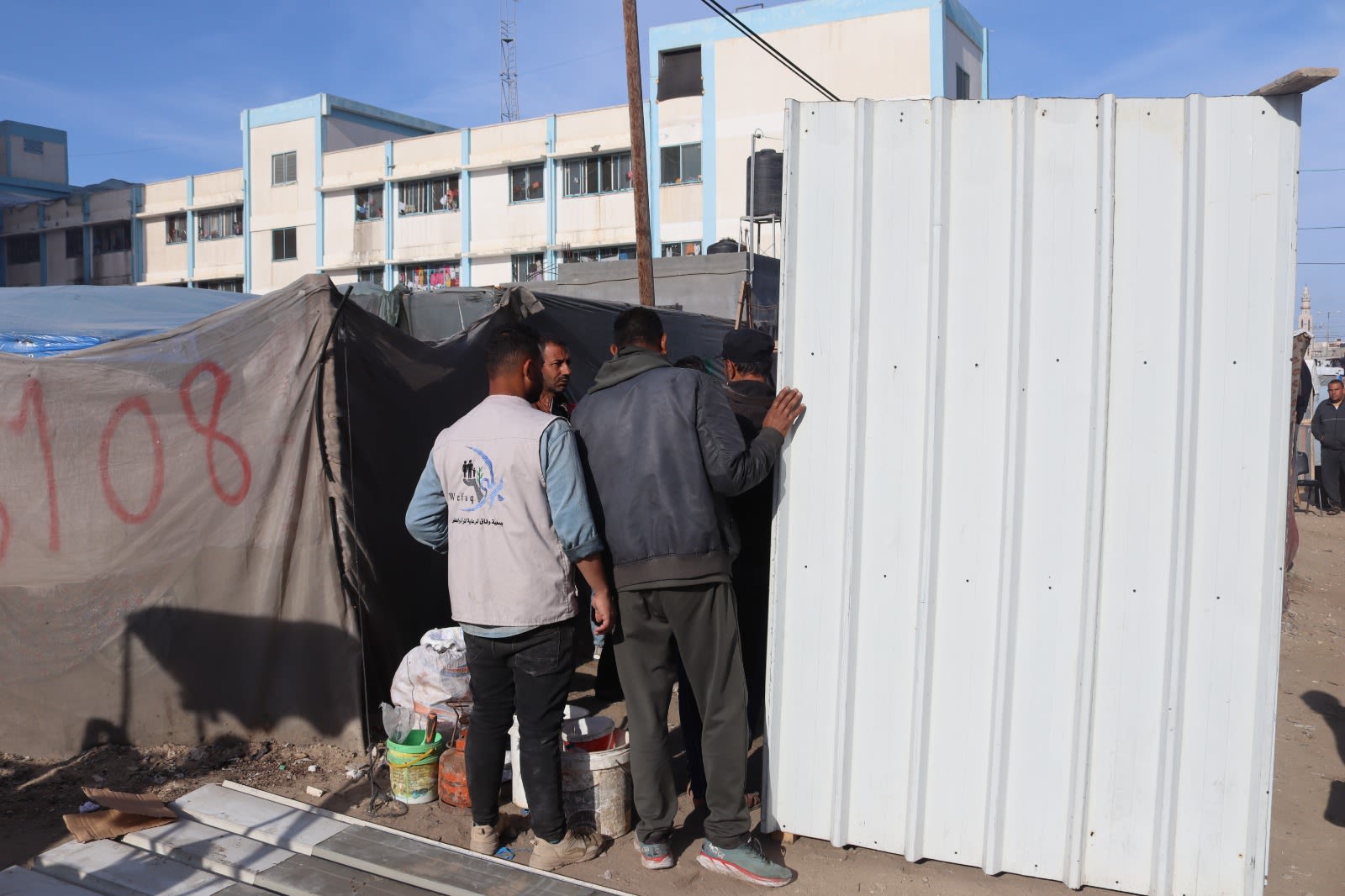
Shelter needs across Gaza are expected to increase with the onset of winter, as more than 1.3 million people are in need of emergency shelter and essential household items. Approximately 900,000 people need winterization support, including vital sealing-off kits for tents and makeshift shelters. Collective shelter sites across Gaza remain severely overcrowded, raising the risk of health and protection issues, and have been regularly targeted by bombardment.
The displaced people are so scared, confused and helpless as winter approaches. They have no adequate clothing, shelter, basic needs and, not to mention, safety. They are in the middle of nowhere with no protection whatsoever," according to one Global Communities staff member in Gaza.
With support from the Bank of Palestine, Global Communities has distributed vital shelter assistance to populations in need. In January, we provided winterization materials— including tarpaulins and rope — benefiting 3,000 people. Global Communities also provided winterization vouchers in December, with additional support from the Bank of Palestine, allowing 1,000 families to access urgently needed winter clothing.
Shelter needs across Gaza are expected to increase with the onset of winter, as more than 1.3 million people are in need of emergency shelter and essential household items. Approximately 900,000 people need winterization support, including vital sealing-off kits for tents and makeshift shelters. Collective shelter sites across Gaza remain severely overcrowded, raising the risk of health and protection issues, and have been regularly targeted by bombardment.
The displaced people are so scared, confused and helpless as winter approaches. They have no adequate clothing, shelter, basic needs and, not to mention, safety. They are in the middle of nowhere with no protection whatsoever," according to one Global Communities staff member in Gaza.
With support from the Bank of Palestine, Global Communities has distributed vital shelter assistance to populations in need. In January, we provided winterization materials— including tarpaulins and rope — benefiting 3,000 people. Global Communities also provided winterization vouchers in December, with additional support from the Bank of Palestine, allowing 1,000 families to access urgently needed winter clothing.
MICROBUSINESSES & COOPERATIVES
Grants Fuel Economic Revival from the Rubble
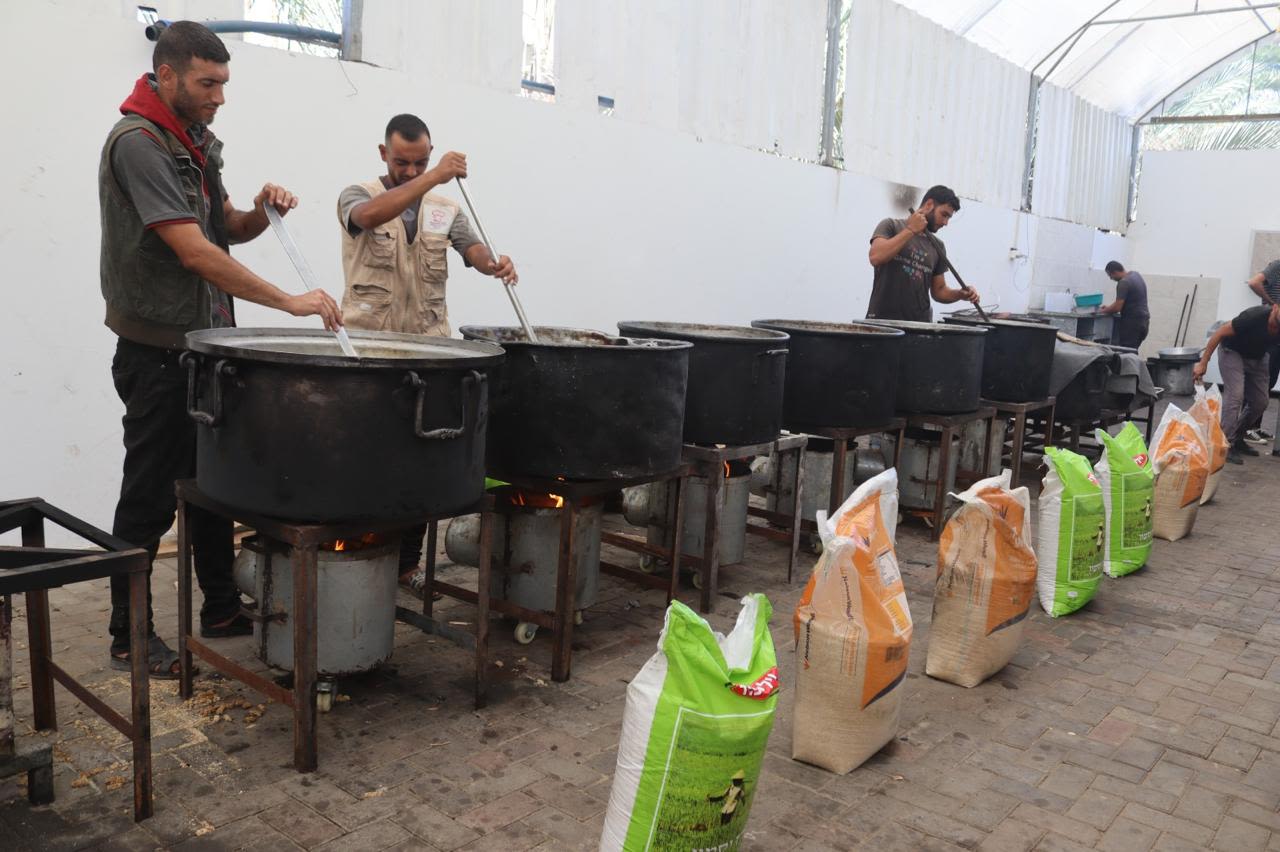
Even amid unconscionable levels of destruction and devastation, glimmers of hope have begun to emerge. With funding from the Swedish International Development Agency (SIDA) and the Palestine Investment Fund, and in collaboration with local partner Wefaq Society for Women and Child Care, Global Communities is providing grants to support microbusinesses and cooperatives with rebuilding and expansion efforts.
Al-Jawhara Bakery has successfully expanded its operations in Deir Al-Balah after relocating from Rafah. With new machinery and equipment, alongside subsidies to mitigate high fuel costs, the bakery has doubled its production capacity and created three new jobs.
Through the grant, we improved the bakery noticeably,” said Sameh, the bakery’s manager. “This includes increasing the number of workers and productivity through supplying necessary equipment to re-open the bakery. ... We also launched new selling points in Khan Younis.”
Another grant that is helping to drive local economic growth and supporting conflict-affected communities through this challenging time is for Al-Rabee' Kitchen, a family-owned business operating in Deir Al-Balah and Khan Younis. Work has begun to rehabilitate land near the kitchen with necessary infrastructure and WASH facilities as well as to provide the business with stoves, cooking pots and a solar energy system to serve an additional 22,550 individuals who have been displaced. Once completed, this intervention will increase the production capacity of Al-Rabee' Kitchen from 112 pots of hot meals per day to 200 (an 80% increase) and create 10 new jobs.
Even amid unconscionable levels of destruction and devastation, glimmers of hope have begun to emerge. With funding from the Swedish International Development Agency (SIDA) and the Palestine Investment Fund, and in collaboration with local partner Wefaq Society for Women and Child Care, Global Communities is providing grants to support microbusinesses and cooperatives with rebuilding and expansion efforts.
Al-Jawhara Bakery has successfully expanded its operations in Deir Al-Balah after relocating from Rafah. With new machinery and equipment, alongside subsidies to mitigate high fuel costs, the bakery has doubled its production capacity and created three new jobs.
Another grant that is helping to drive local economic growth and supporting conflict-affected communities through this challenging time is for Al-Rabee' Kitchen, a family-owned business operating in Deir Al-Balah and Khan Younis. Work has begun to rehabilitate land near the kitchen with necessary infrastructure and WASH facilities as well as to provide the business with stoves, cooking pots and a solar energy system to serve an additional 22,550 individuals who have been displaced. Once completed, this intervention will increase the production capacity of Al-Rabee' Kitchen from 112 pots of hot meals per day to 200 (an 80% increase) and create 10 new jobs.
Through the grant, we improved the bakery noticeably,” said Sameh, the bakery’s manager. “This includes increasing the number of workers and productivity through supplying necessary equipment to re-open the bakery. ... We also launched new selling points in Khan Younis.”
... The resilience of the people in Gaza has been nothing short of amazing. They continue to find ways to survive and support one another, but they cannot do it alone,” says one Global Communities staff member. “The international community must step in to provide meaningful, sustained support, especially as resources become scarcer. Behind every statistic are individuals —mothers, fathers, children — whose lives have been upended, and they deserve the world’s attention and compassion now more than ever.”
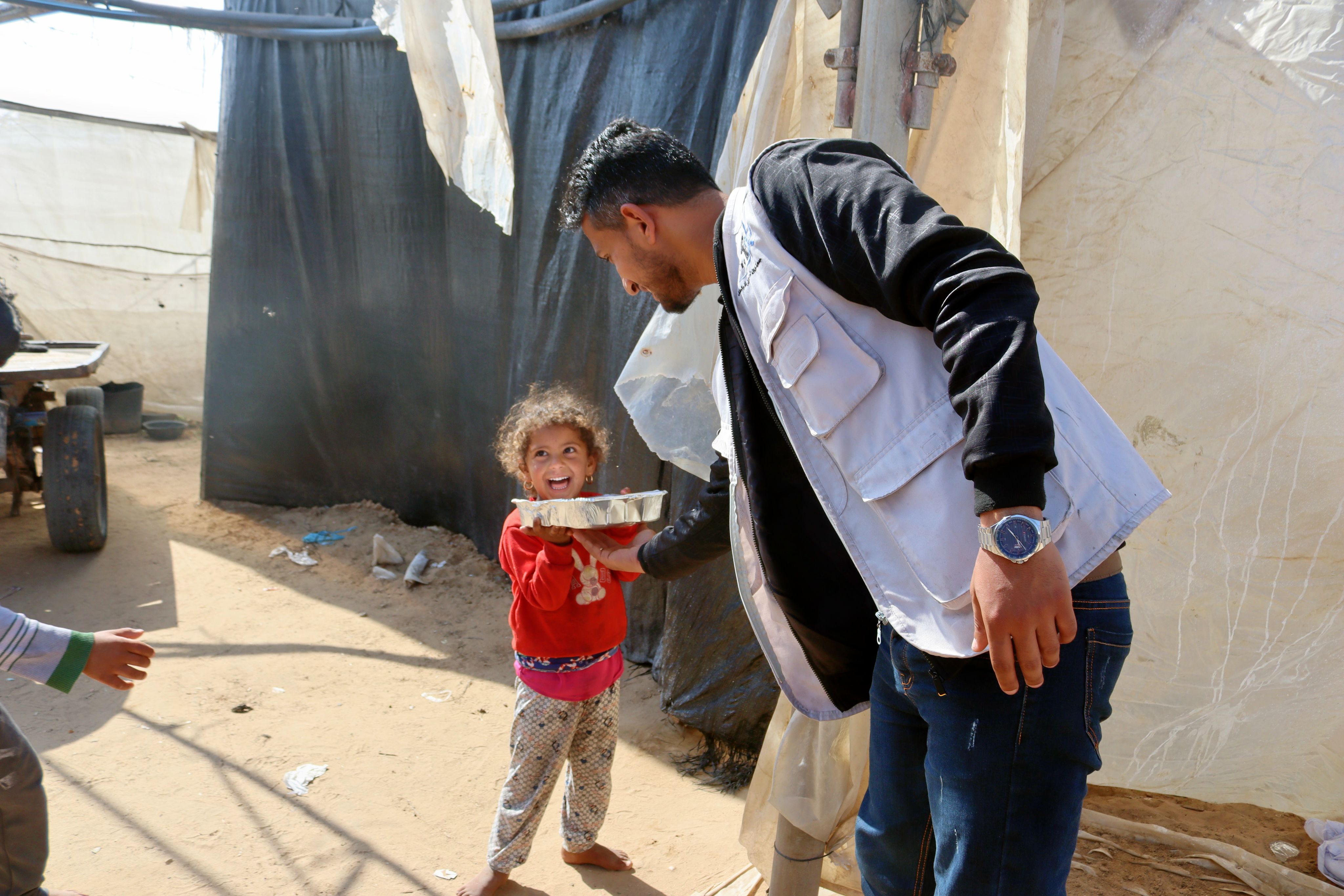
Since 1994, Global Communities has fostered deep ties with Palestinian communities, focusing on needs-based, equitable and sustainable initiatives. Our diverse programs over nearly three decades include youth engagement, governance and capacity building, infrastructure building, economic development, WASH and protection. Global Communities has a history of scaling up responses to meet urgent humanitarian needs in Gaza, including in 2009, 2014 and 2021. To learn more, visit globalcommunities.org.


